STEVEN GERRARD.
“You don’t accomplish anything by yourself”

THE QUARTERLY LEADERSHIP & PERFORMANCE JOURNAL OF THE LMA. SPRING 2023 | ISSUE 54

thestaffordlondon.com 16-18 St James’s Place, London, SW1A 1NJ +44(0)20 7493 0111 | reservations@thestaffordlondon.com UNRIVALLED LUXURY, EXCLUSIVE ST JAMES’S ADDRESS
More managers and coaches than ever before have attended LMA Institute of Leadership and High Performance events, including our series of Masterclasses, Webinars and Technical Panels, and I would like to thank all of our recent contributors, including Dr Mustafa Sarkar, Katie Mobed and Rebecca Levett. The work of the Institute is essential in helping managers and coaches develop and reach their potential, and we hope that our attendees continue to find these events beneficial.
The LMA continues to grow, with a specific focus on providing bespoke services for its members, and I am delighted to introduce you to the LMA’s new Head of Psychology and Mental Health, Jennifer Lace. Jennifer brings a blend of strategy and applied psychological practice, having worked as a psychological practitioner supporting individuals, teams of staff and
LMA Chief Executive
RICHARD BEVAN OBE.
As we approach the final stages of another thrilling football season, we take this opportunity to reflect on our last few months of delivery across all of the LMA’s services.
athletes of all ages, and leading psychology departments within club and international football for more than 10 years. In her role with the LMA, Jennifer provides 1-to-1 mental health support and guidance to LMA members and their families, collaborates with a wide range of working groups across football’s stakeholders, and guides and shapes the LMA Institute of Leadership and High Performance programmes from a psychology perspective. She provides high-quality expert psychology insight across all areas of the LMA’s work.
We are delighted also to announce the launch of a new coaches association, the League Coaches Association (LCA), for all football coaches and technical staff, including technical directors, analysts and scouts, across the English professional game. The LCA will provide its members with a range of
services, including employment and legal support, a wellbeing and healthcare offering, and personal and professional development programmes. The launch of the LCA, with the support of the LMA and the Premier League, marks an important step in how the game supports its workforce. It will have a significant impact on those who develop talent and foster high performance in our game, and we encourage those who are eligible for membership to join.
Finally, we note with interest the news of a new independent regulator and plans to protect the long-term future of English football, following a fan-led review of football governance. We look forward to continuing to work with football’s key stakeholders to advocate for positive change and support all future development across the game.

LMA CHIEF EXECUTIVE
League Managers Association 3


reservations@kimptonfitzroylondon.com | +44 (0)20 7123 5000 kimptonfitzroylondon.com | 1-8 Russell Square, London WC1B 5BE GRAND, GLAM, WITH A BANG BLENDING LUXURY WITH HEART IN BLOOMSBURY
Alice Hoey
FROM THE EDITOR.
In this spring edition of The Manager we’re delighted to welcome Jennifer Lace, the LMA’s new Head of Psychology and Mental Health. In her column on page 72 she talks about her goals of expanding and enriching the LMA’s offering to members, and the pride she feels in heading up an experienced team with such combined strength.

They are sentiments shared by former Rangers manager Steven Gerrard in our cover interview, who was at pains to emphasise the team effort it took to win the club’s 55th Scottish Premiership title. “Achieving anything is a process, a journey, and it’s never about just one individual,” he says. “Credit is due to the supporters and the people in the background – the kit man, and the people working in the canteen and cleaning the dressing rooms. It was an entirely collective achievement that, ultimately, enabled the players to thrive.”
While paying tribute to those around them shows both Lace’s and Gerrard’s humility, it’s also fair to say that in any high-
performing team the leader, and his or her star performers, are in effect just the tip of the iceberg. Behind the scenes of any successful organisation is an orchestra, a multitude of parts playing different tunes in perfect harmony.
In our feature on page 28 we look at the leader’s crucial role in understanding the various roles played by their team members and ensuring that they work in harmony. It’s no mean feat, especially given few managers have the liberty of cherry-picking their teams, on or off the pitch.
It requires leaders with a deep understanding of people’s preferences and
needs and, above all, expert communication. “We need a shared understanding, going deeper than just thinking in terms of formal roles to think about people’s preferences, life stories, and what they bring to the table in terms of team dynamic and culture,” says Senior Performance Psychologist Dr Chris Wagstaff.
Managers, of course, need to understand their key performers in order to help them fulfil their potential but, as Gerrard found at Rangers, success is the result of a far wider team effort. The real challenge and opportunity may therefore be reaching wider and deeper, to conduct not just the strings, but the whole orchestra.
THE MANAGER League Managers Association 5
WIN BE T TER

T HE W OR L D ' S MO ST E X T E NS I VE L IB R A RY OF P R OF E S S ION A L C O A CHING S E S S ION S AT YOUR F INGE R T IP S
el i t e socce rcoachin g .n e t
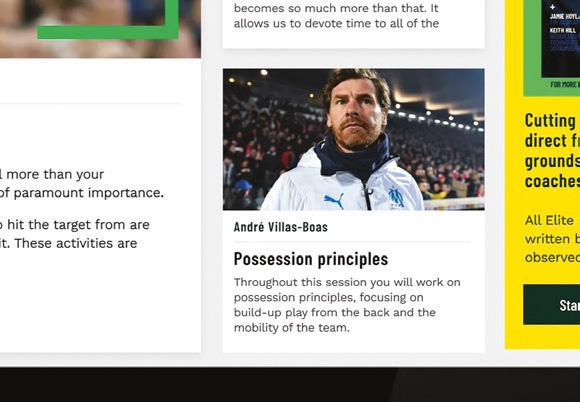

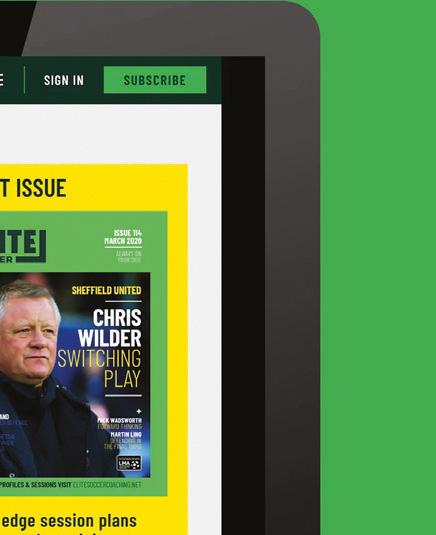
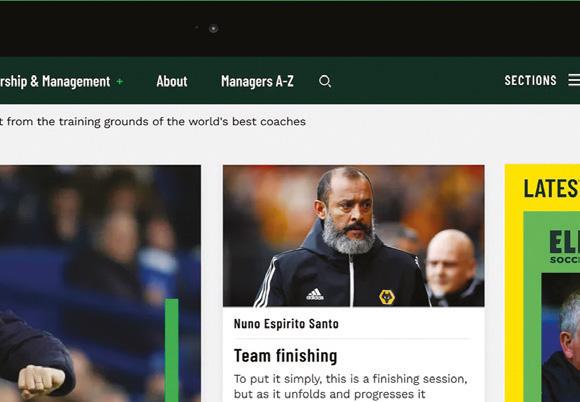

“ I w i s h I ’d ha d i t w he n I s t a r te d co a c hi n g ” S ir A l e x Fe r g u s o n CBE
“A f a n t a s t i c m a g a z i n e ” r OBE e g n e W e n è s r A


“ l l o ok f o r w a r d t o r e c e i v i n g e ve r y i s s u e ” J o s e M o u r in h o

C E L E B R A T I N G 1 0 Y E A R S A S T H E C O A C H E S
C HOI C E
’
The League Managers Association, St. George’s Park, Newborough Road, Needwood, Burton upon Trent DE13 9PD
The views and opinions expressed by contributors are their own and not necessarily those of the League Managers Association, its members, officers or employees. Reproduction in whole or in part without written permission is strictly prohibited.

www.leaguemanagers.com
EDITOR
Alice Hoey
alicehoey1@gmail.com
EDITOR FOR THE LMA
Sue McKellar
Sue.Mckellar@leaguemanagers.com
ART DIRECTOR
Ian Cherry
Ian.Cherry@leaguemanagers.com
CONTRIBUTING EDITOR
Gabriella Ward
Gabriella.Ward@leaguemanagers.com
SENIOR WRITER
Mark Farthing
Mark.Farthing@leaguemanagers.com
PUBLISHER
Jim Souter
Jim.Souter@leaguemanagers.com
BUSINESS DEVELOPMENT
Adam Tarrant
Adam.Tarrant@leaguemanagers.com
DESIGN
Luna Studio
PHOTOGRAPHY
Reuters, Action Images, Alamy, iStock, Adam Roussak, Robbie Fowler Academy, Thousand Star Media
PRINT PARTNER
Jellyfish Solutions Limited
League Managers Association
THE MANAGER 7

Column:
On the cover: Steven Gerrard MBE Feature: Role model Patience of the Saints: Marieanne Spacey-Cale MBE To speak or not to speak: Patrick Harverson Key takeaways: Katie Mobed From another sport: John Mitchell 16 20 28 34 40 46 50 THE LEADER. 15
Floyd Woodrow MBE
Spring 2023 // Issue 54. The quarterly leadership and performance journal of the LMA.
don’t
yourself” 20
STEVEN GERRARD MBE. “You
accomplish anything by
The Editor:
Hoey In Tribute: Gianluca Vialli 3 5 10 3 WELCOME. The Manager Journal 8
LMA CEO: Richard Bevan OBE
Alice
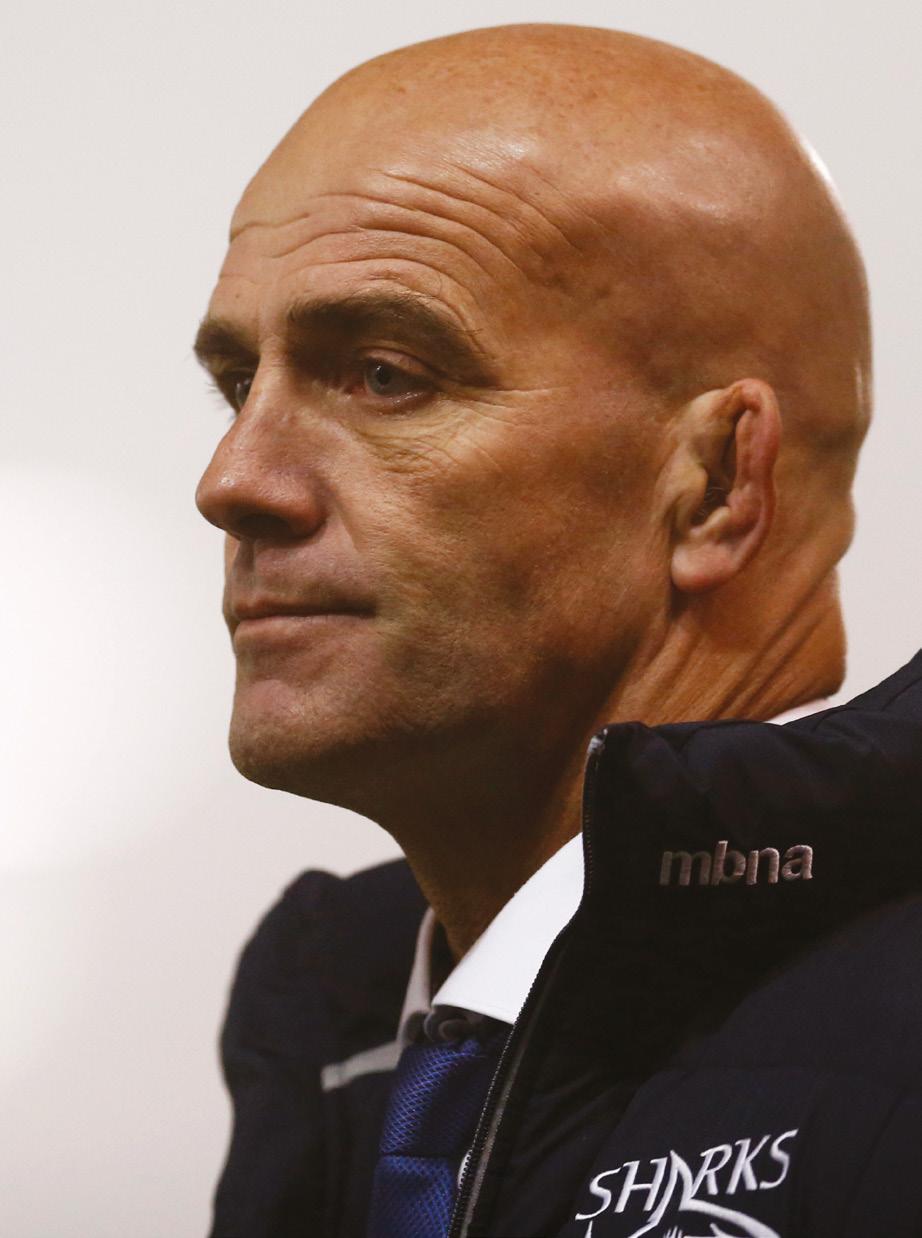
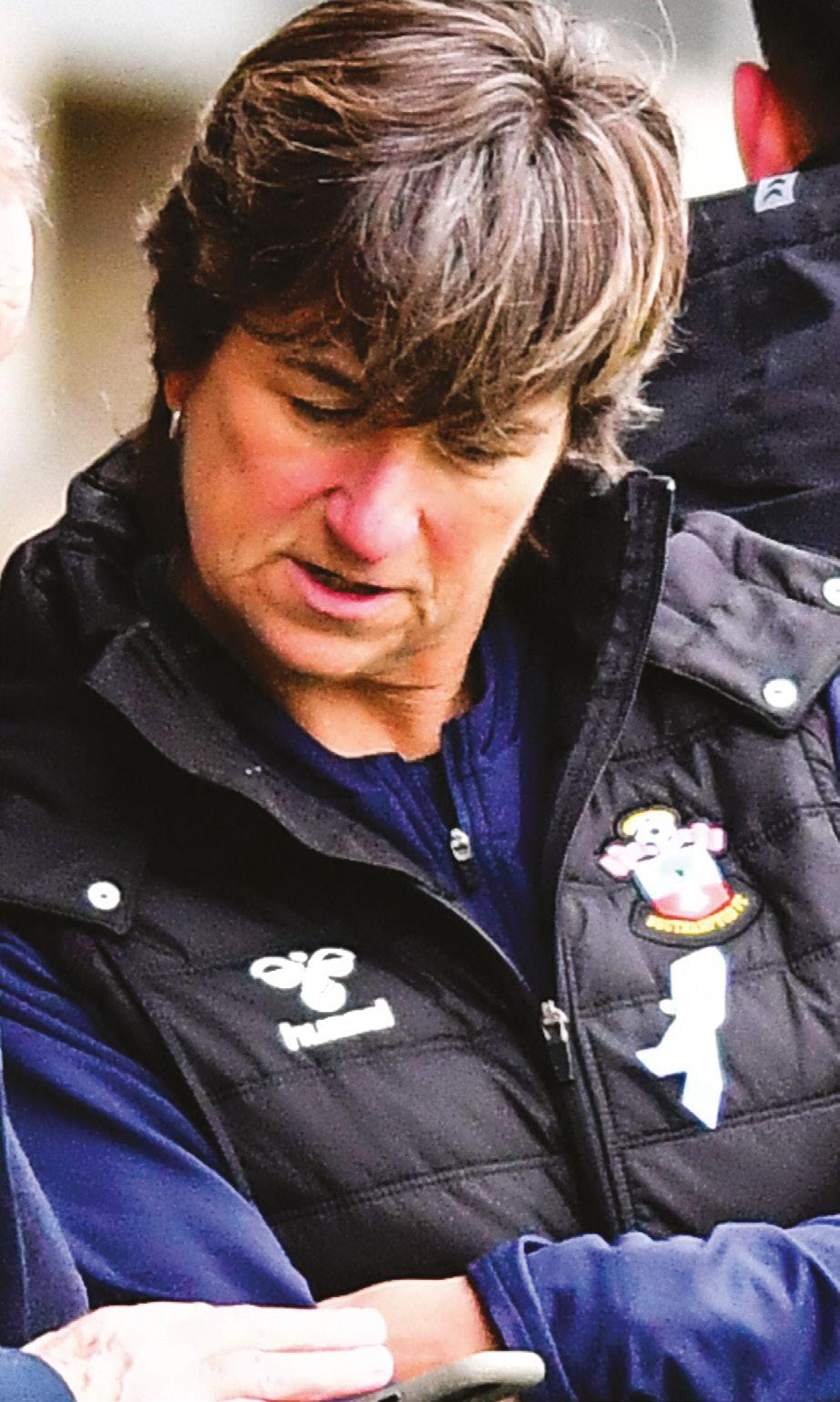
The Robbie Fowler Academy Premier League The FA Just a moment LMA Commercial activities LMA Institute activities League Coaches Association launch LMA Technical LMA In The Game Column: Jennifer Lace How to: Embrace diversity Feature: Force of habit 10 Ideas: Screening 86 90 92 94 58 60 62 64 66 72 74 76 80 THE GAME. 85 57 71 LMA NEWS. PERSONAL PERFORMANCE & WELLBEING. THE MANAGER League Managers Association
JOHN MITCHELL.
50 34
MARIEANNE SPACEY-CALE MBE.
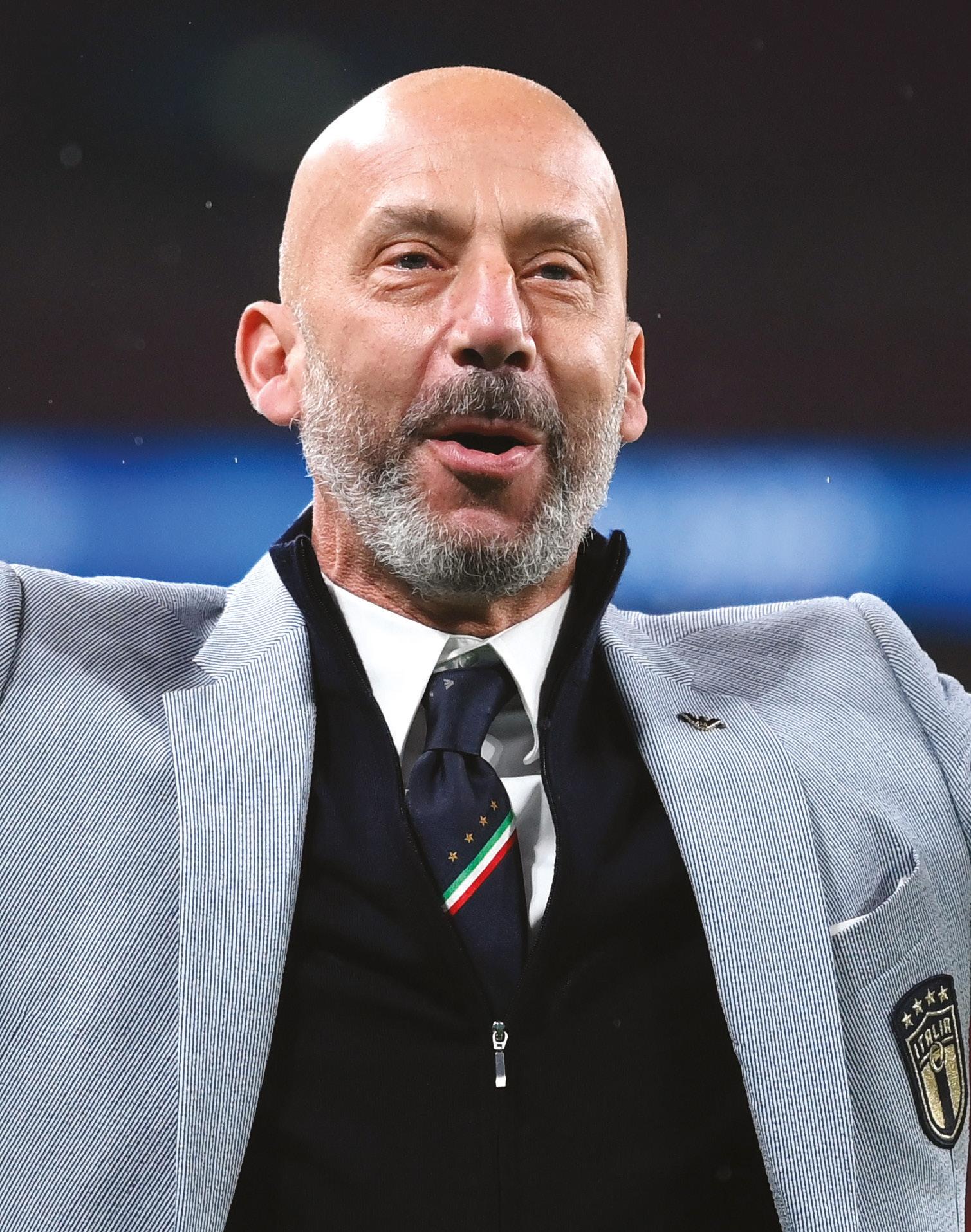
IN TRIBUTE
GIANLUCA VIALLI
1964-2023
 Photography: Reuters // Action Images
The LMA remembers member, former manager and friend Gianluca Vialli.
Photography: Reuters // Action Images
The LMA remembers member, former manager and friend Gianluca Vialli.
I FEEL PRIVILEGED TO HAVE KNOWN GIANLUCA PERSONALLY FOR 15 YEARS. HE WAS ALWAYS SUPPORTIVE OF OUR WORK AT THE LMA. HE SHOWED A PARTICULAR INTEREST IN THE CAREER DEVELOPMENT OF YOUNGER COACHES AND MANAGERS, A TRUE REFLECTION OF HIS GENUINE HUMILITY AND HIS CARE FOR HIS COLLEAGUES THROUGHOUT FOOTBALL.

 Richard Bevan OBE
Chief Executive
21st May 2000: Chelsea Manager Gianluca Vialli joins the Chelsea FA Cup Parade, Fulham Broadway. Reuters // Action Images
LMA
25th August 2000: Chelsea Manager Gianluca Vialli during training. Reuters // Action Images
Richard Bevan OBE
Chief Executive
21st May 2000: Chelsea Manager Gianluca Vialli joins the Chelsea FA Cup Parade, Fulham Broadway. Reuters // Action Images
LMA
25th August 2000: Chelsea Manager Gianluca Vialli during training. Reuters // Action Images
One of the most outstanding players of his generation, Gianluca began his coaching career at Chelsea, taking over as player-manager in 1998. He succeeded in steering the side to a cup double in the early months of his managerial career, becoming the youngest winning manager of a UEFA competition at the time.
Further success followed in the 1998/99 season, with a UEFA Super Cup victory over Real Madrid and a third-place finish in the Premier League, earning Chelsea qualification to the UEFA Champions League for the
first time in the club’s history.
Gianluca led Chelsea to the Quarter Finals of the Champions League in 2000 and won his fourth trophy, beating Aston Villa in the 2000 FA Cup Final.
After managing Watford in the First Division for the 2001/02 season, he turned his attentions to other passions, but remained a valued member of the LMA. He returned to football in 2019 as Delegation Chief of Roberto Mancini’s Italy senior men’s national team, which went on to win the 2021 UEFA European Championship.

13 League Managers Association
Gianluca Vialli celebrates with the fans. Reuters // Action Images
At Arbuthnot Latham we have a dedicated team who focus on sports professionals at every stage of their careers. The breadth of our service offering across banking, lending, financial planning and investment management means we can help you, your family, and your business interests.

Speak to one of our experts:
Alex Wolahan-Black
Head of Business Development
Direct: +44 (0) 207 012 2338
Mobile: +44 (0) 7557 441317
Email: AlexWolahan-Black@arbuthnot.co.uk
Bhavick Patel
Senior Private Banker
Direct: +44 (0) 207 012 2732
Mobile: +44 (0) 7741 198307
Email: BhavickPatel@arbuthnot.co.uk
On life’s journey we’re here to help you go further
THE LEADER.

THE MANAGER League Managers Association 15
LEADER COLUMN
Floyd Woodrow MBE

Compass for Life
REACH YOUR NORTH STAR.
With the right tools, motivation and planning, you can chart a course for a successful and rewarding journey.
THE MANAGER
16 The Manager Journal
The Compass for Life philosophy comprises four areas, or compass points, and I believe that when you have these four in equilibrium you become hard to beat, even on your worst day.
The first of these compass points is the Super North Star. This is your goal, where you want to be in the next three, five or 10 years, and it can be big or small. The Super North Star propels you forward on a journey of adventure and discovery, during which you’ll learn new skills and find out what really motivates you.
Having everyone aligned around the same Super North Star is key to the success of any team. Team members don’t have to like one another, but they do need to trust and respect one another, and want to be there. Once a decision has been made around the direction of the team and how it will get there, there must be unity and commitment. That strategy may change along the way, but it will be the leader’s decision to do so; the team won’t dismantle it en route.
Looking ahead to those medium and long-term goals, leaders should keep one eye on what they want their legacy to be, i.e. to leave their position in a better place than when they arrived. Being conscious of your legacy helps you to be more aware of
your actions and behaviours, and of the impact they might have in the future. The Mexicans believe that you die twice, once when your body dies and again when the last person who knows you says your name. I think that’s very powerful. We shouldn’t be aiming for stature, but for others to remember us for being good people for as long as possible.
The second area, South Cardinal, is about strategy and the application of facts, figures and detail. Your Super North Star might be five or 10 years in the making, and looking ahead to that can be overwhelming. It’s essential, therefore, to break the journey up into smaller goals, with clear milestones along the way. By looking ahead to the next three or six months, and having a clear goal for how you’ll get there, you ensure that you’re setting off in the right direction. Having clear metrics, meanwhile, provides evidence that you’re still on course. It’s important to celebrate and reward your success and progress along the way; with these rewards comes the release of dopamine, oxytocin and endorphins in the brain, which will help you on your journey.
The next compass point is East Cardinal, and that’s about your values, what you stand for, the behaviours you know you need to be successful, and
LEADER COLUMN
League Managers Association 17
The Super North Star propels you forward on a journey of adventure and discovery, during which you’ll learn new skills and find out what really motivates you.
PROTECTING YOUR WORLD
Kerry London is proud to be the trusted insurance broker to the LMA. With over 35 years’ experience, and as a Lloyd’s of London accredited broker, Kerry London is well positioned to offer bespoke insurance advice for individuals and their families.
Invaluable Advice, Comprehensive Protection
Kerry London offers a tailor-made service for your personal insurances. Our dedicated private clients team is here to advise on a range of insurances:
Home Insurance
Competitive buildings and contents cover for homeowners, landlords and tenants.
Property Owners and Investor’s Insurance Insurance designed for owners and landlords of let commercial and residential properties.
Motor Insurance
We cover all types of vehicles and have solutions for owners of specialist cars.

Tel: 020 8225 1000
Email: lma@kerrylondon.co.uk
Web: www.kerrylondon.co.uk
Travel Insurance
Cover for single trips or Annual multi-trip or as part of a combined motor and home portfolio policy.
Art and Jewellery
We can insure your valuable items as part of your home insurance solution, and offer advice on valuations and security.
KL0295-2303

In Partnership with
Registered Office: John Stow House, 18 Bevis Marks, London EC3A 7JB. Registered No. 2006558. Kerry London Limited is authorised and regulated by the Financial Conduct Authority.
your team code of conduct. Important here is building trust, commitment and accountability, and encouraging passionate debate. In successful teams there is open discussion about strengths and weaknesses, and personal and team development. Team members are prepared to challenge one another around the decisions and standards of performance that they adhere to because they are focused on team results, rather than on personal advancement or ego. Having your values and behaviours in alignment means you have the right team culture to be successful.
Lastly, there’s West Cardinal, which is about being a warrior. That doesn’t mean being big
and tough, but rather having the strength and character to reach each of the milestones that you’ve set yourself. While, clearly, you need the right skillset to achieve that, you also need good mental and physical resilience strategies to cope with the pressure and challenges you’ll face on your journey.
Physically, that means ensuring you’re hydrated, are eating a healthy diet and getting enough quality sleep, and that you’re generally fit enough to perform at a high level. Mental strategies, meanwhile, might include visualisation, positive self-talk, remembering why you’re successful, and having belief partners who can support you and keep you positive and
confident. All of these elements, when you have a good awareness of them, help to lift you up and get you back to performing at your best as quickly as possible.
While pressure is seen as a negative force, when you are equipped with tried and tested physical and mental resilience strategies such as these, it can be something positive, providing an invaluable opportunity to really focus and show your best.

Former soldier and member of the SAS Floyd Woodrow MBE is an expert in leadership training and the author of the Compass for Life methodology.

League Managers Association 19
// iStock
Interview: Sue McKellar
Photography: Reuters // Action Images
Steven Gerrard reflects on the collective change mindset that was integral to Rangers securing their 55th title.

“YOU DON’T ACCOMPLISH ANYTHING BY YOURSELF”.
THE MANAGER 20
STEVEN GERRARD
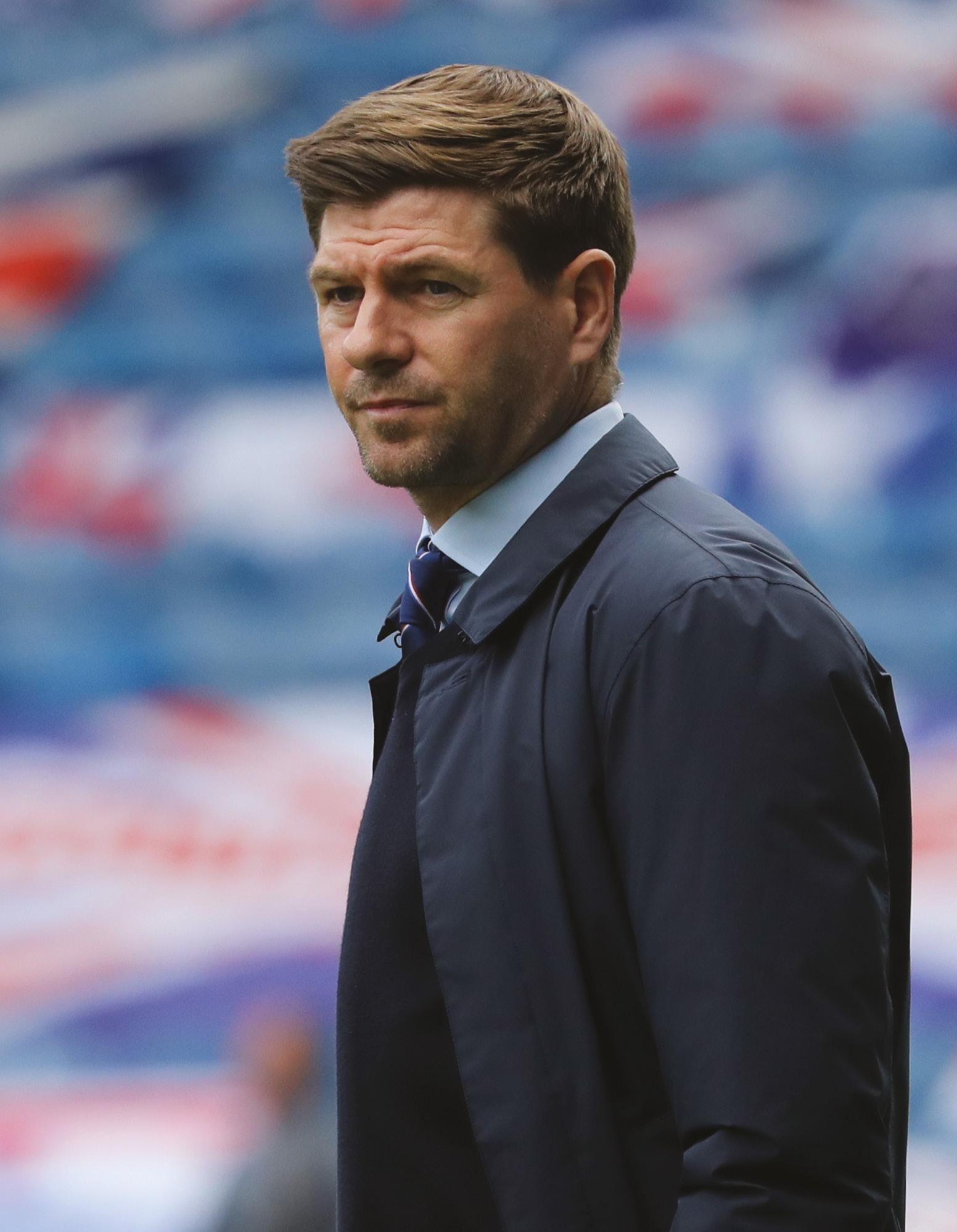
Focused totally on his role as Liverpool captain, Steven Gerrard was well into his 30s before his thoughts turned to coaching. Even as he was completing his coaching badges, on the suggestion of then manager Brendan Rodgers, he took some convincing.
“I wasn’t entirely sure that coaching was for me,” says Gerrard. “I thought I might have gone into TV punditry, because I love watching and analysing the game.” It was a long conversation with Alex Inglethorpe at the Liverpool FC Academy on his return from the US that convinced him otherwise. “Alex said he thought I had a lot to offer,” he recalls, “that I’d shown many leadership qualities at Liverpool and England that would be valuable in a coaching or management role.”
Jürgen Klopp, who had then taken the helm at Anfield, agreed wholeheartedly. Gerrard was given the opportunity to shadow
Inglethorpe and Neil Critchley at the academy and to spend time with Klopp, who was keen for him to have time to develop as a coach within the safety of the academy. “Jürgen wanted me to be able to learn from my mistakes, out of the public eye,” says Gerrard, who went on to coach the U18s while being supported in his development as a coach, step by step.
SCOTLAND BOUND
Small steps turned into big leaps, however, when after 16 months with the U18s the chance to manage Rangers came along. “It took me aback,” admits Gerrard, who saw an opportunity that was too good to miss, even if it meant leaving the club that had supported him since the tender age of seven. Again, Liverpool were supportive of this next stage in Gerrard’s development.
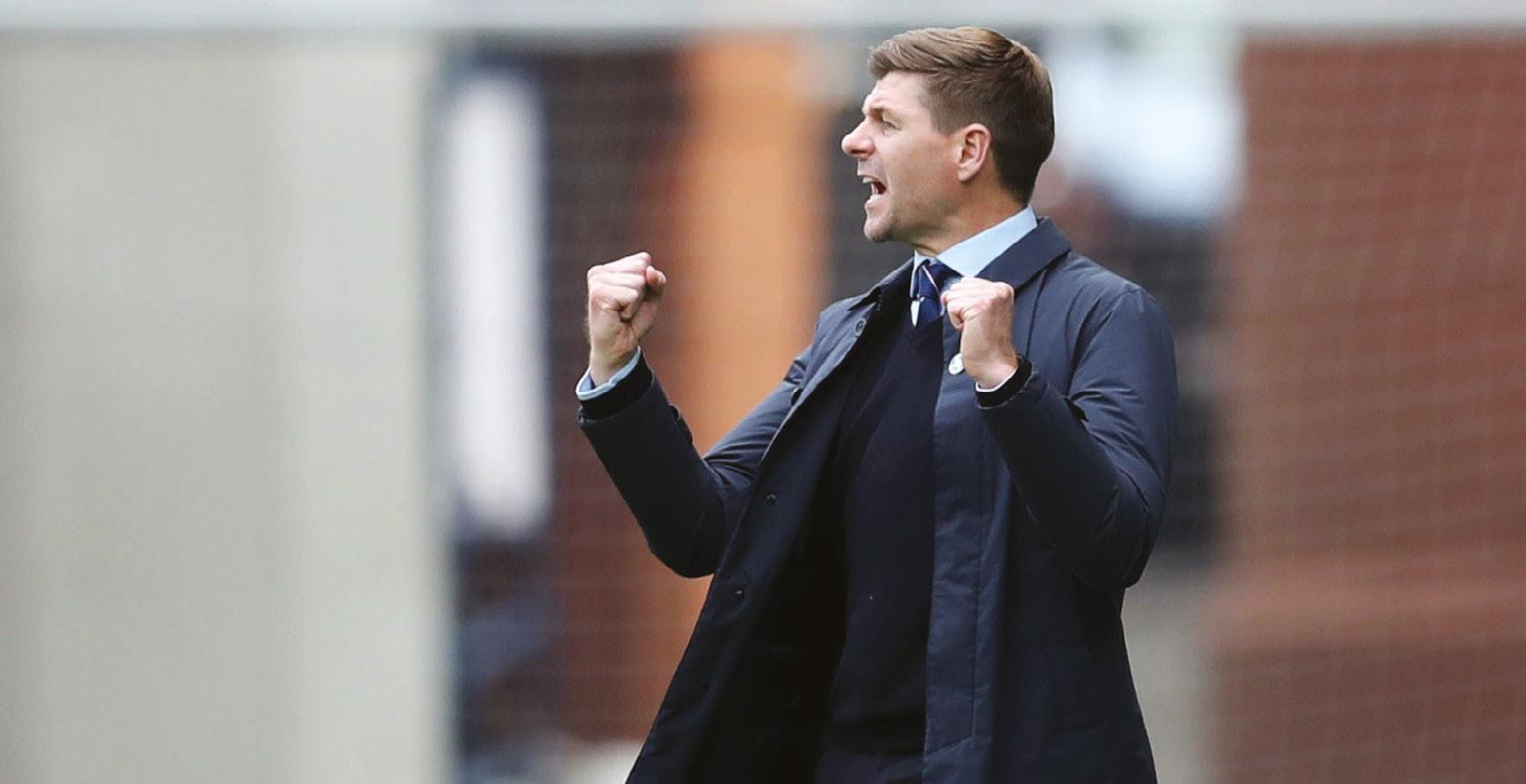
“As soon as I came off the call with Rangers I knew it was the right club culture for me,” he says. “I immediately felt wanted
and I saw the potential for me to have a genuine connection with the supporters.”
With Celtic dominating Scottish football at the time, Gerrard might have felt encumbered by the weight of expectations on his shoulders. It was, however, a challenge he relished. “I’ve always been game for those types of risks and I knew that if I could forge good relationships with the supporters, the players and my coaching team then we had huge potential to be successful. You don’t accomplish anything by yourself, so humility and working with everyone in the club, both on and off the pitch, is incredibly important.”
OPEN DOORS
In order that everyone can give their best game, of course, a new leader needs to recruit wisely, communicate clearly and empower their people as much as possible. Communication is especially key during that initial period of change.
AS SOON AS I CAME OFF THE CALL WITH RANGERS I KNEW IT WAS THE RIGHT CLUB CULTURE FOR ME.
THE MANAGER
Gerrard considers himself fortunate to have learned from, and been supported by, some hugely experienced and successful managers; Walter Smith OBE, Sir Alex Ferguson CBE and Jürgen Klopp.
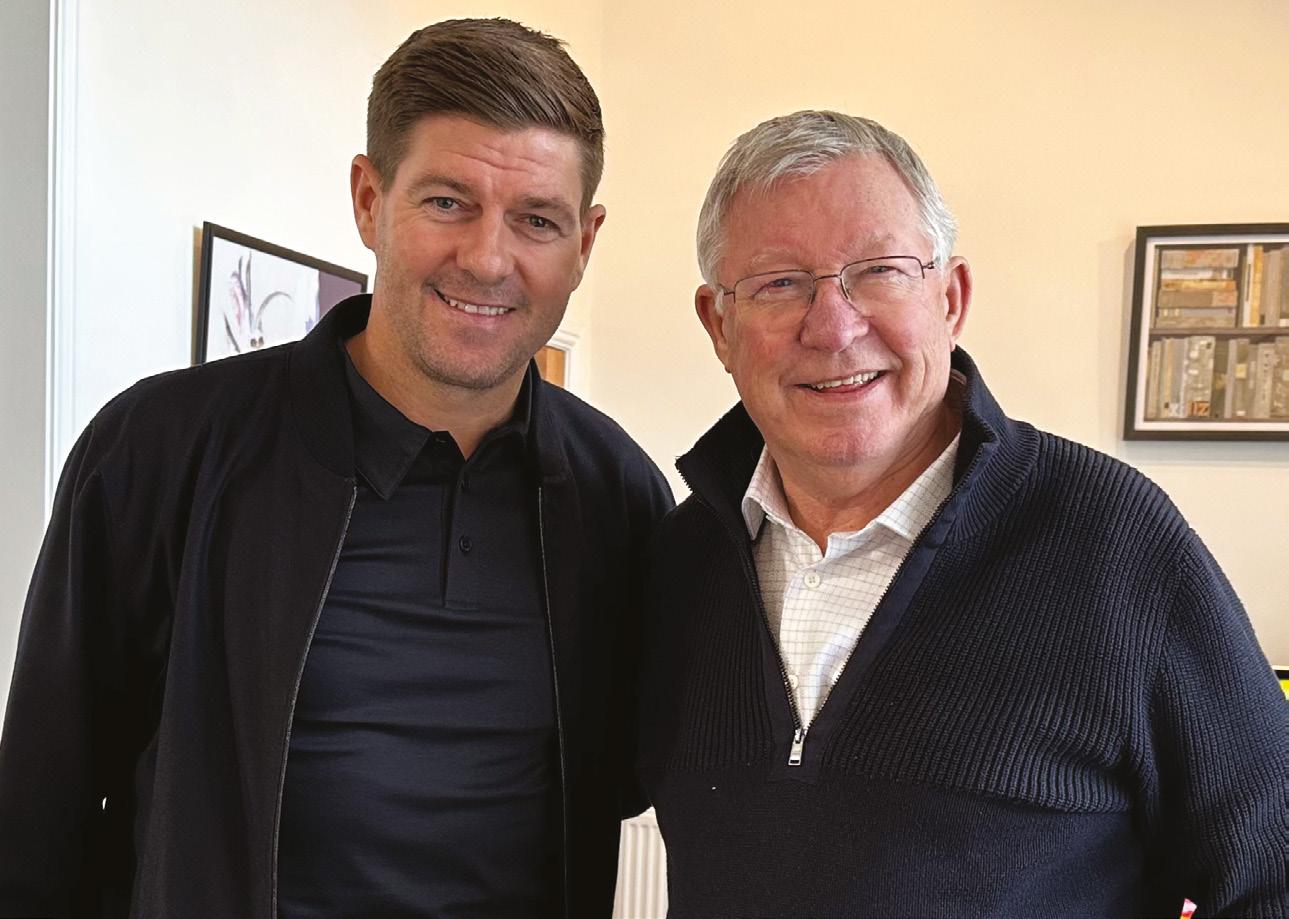


For Gerrard, communication at Rangers was honest and transparent right from the start, and that was crucial in giving him the confidence to take on what would have been a huge challenge for anyone new to first-team management. “I knew that the chairman, Dave King, had my back, that we would work well together and that he would be there to guide me as a young manager should I need it,” says Gerrard. “He fully understood the situation the club was in, but we put in place a plan together, we met regularly and knew there needed to be clarity and alignment from top to bottom, with everybody pulling in the same direction.”
Gerrard, meanwhile, brought to Rangers an in-depth experience of what it takes to create an elite football environment and, with the support of King and the Board, implemented sweeping changes to everything from player nutrition and the sports science and medical departments, to the pitches, visual identity and the feel of the training ground. All
of this took place, meanwhile, in the context of a punishing league schedule and European qualifiers.
TEAM EFFORT
Despite what he describes as ‘painful periods and setbacks’ along the way, Gerrard led the club to some huge achievements, winning the Scottish Premiership unbeaten (denying Celtic their 10th successive title in the process) and topping their Europa League group to reach the last 16.
“When you achieve anything, though,” he adds, “it’s a process, a journey, and no matter what anyone says, it’s never about just one individual. I, and everyone in my coaching staff, played our part in achieving Rangers’ 55th title, but actually huge credit is also due to Rangers Sporting Directors Mark Allen and Ross Wilson, the incredible supporters, the people in the background – our kit man, Jimmy Bell, for example, and the people working in the canteen and cleaning the dressing rooms – and of course the Board. It’s very important to

55 WASN’T DOWN TO ANY ONE INDIVIDUAL; IT WAS DUE TO A HUGE TEAM OF PEOPLE WHO CAME TOGETHER TO PLAY A CRUCIAL PART IN THE CLUB RECLAIMING SUCCESS.
The Manager Journal 24 THE MANAGER
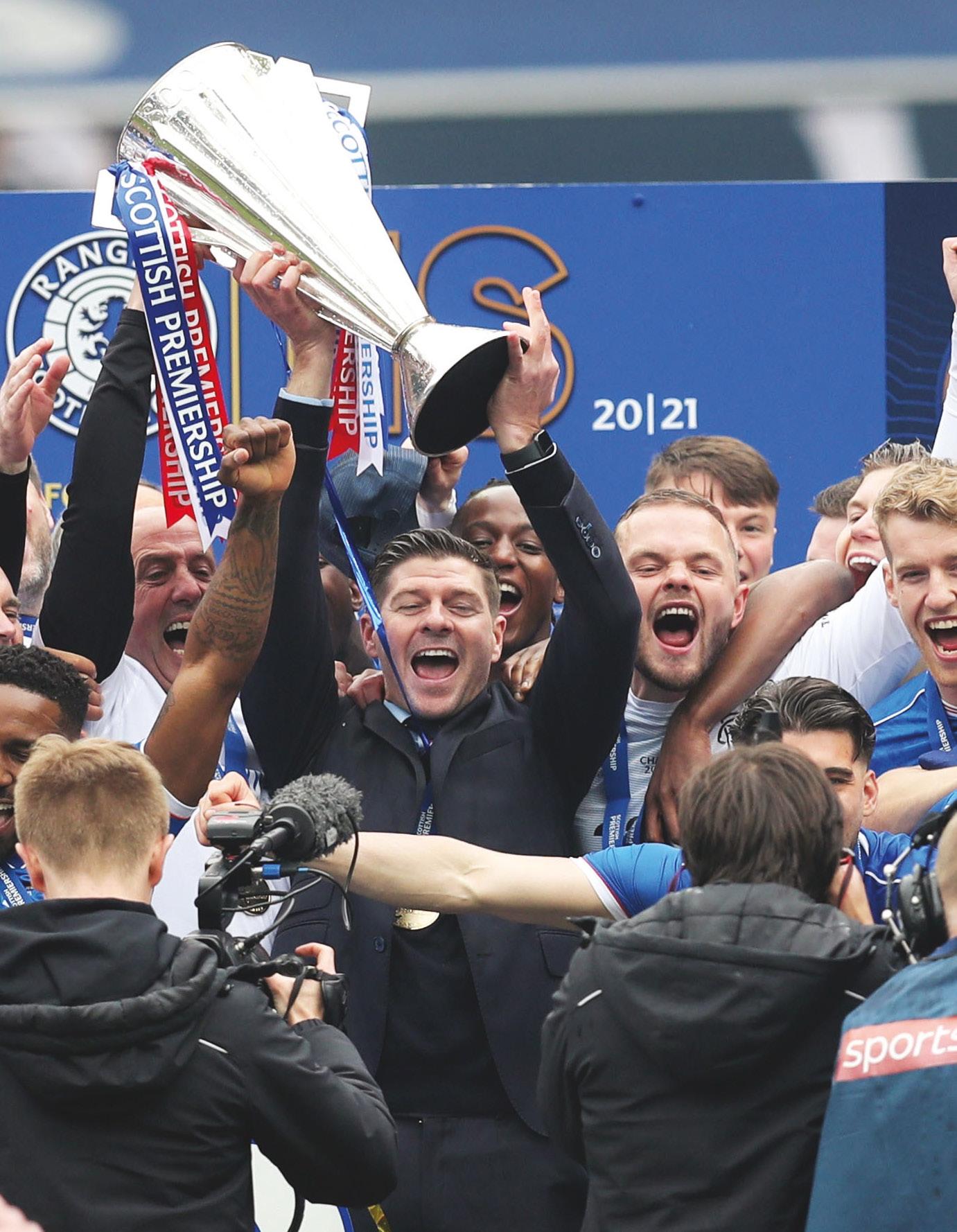
League Managers Association 25
recognise that ‘55’ wasn’t down to any one individual; it was due to a huge team of people who came together to play a crucial part in the club reclaiming success.
And it wasn’t always easy, he admits. “Understandably, people often fear change, so it’s really important to be able to communicate your ideas clearly. During any period of change within football there are difficult conversations to be had, for example, when you have to tell players they aren’t part of the squad moving forward. I then had the challenge of going out and convincing players we targeted that Rangers was the football club for them, and that they could improve the team and keep taking the club forward. There were times when I had to take criticism, pressure and responsibility on my own shoulders to protect my staff and my players.”
With humility a central part of Gerrard’s leadership style, though, this need to protect and look after his team as people was especially important. He was keen that his players and everyone else at the club felt his support and respect. “I always strive to communicate with clarity and to be approachable,” he says. “I believe in an open door policy and want everyone in the club to feel that they can come to me, because we are all in it together.”
ACCELERATED LEARNING
For Gerrard, who has a keen thirst for knowledge, managing Rangers in the Europa League provided invaluable learning. “Our experiences in Europe accelerated my development as a manager,” he says. “To reach the last 16 of the Europa League we challenged ourselves against some high-quality opposition and punched above our weight many times during that journey. That was very much because of our culture of togetherness, our philosophy and the way we played. Again, these achievements weren’t down to one individual, but rather the result of a collective effort across the club.”
Gerrard’s approach to management also enables those around him to continue to learn. “I’m someone who is self-aware, I know my own skill set and I know I’m not perfect,” he says. “I have strengths and I like to put a team of staff around me to support those strengths. I’m also a great believer in empowering my players and staff with responsibility. The role of the modern manager is extensive and is evolving constantly.
“Each manager will have their own approach as to whether they to do all of the on-field coaching themselves or empower a coach to do it, and monitor it closely. I tend to prefer the latter approach, because when
 Liverpool’s Steven Gerrard MBE lifts the Champions League trophy with his team mates. Reuters // Action Images
Liverpool’s Steven Gerrard MBE lifts the Champions League trophy with his team mates. Reuters // Action Images
THE MANAGER The Manager Journal 26
I BELIEVE IN AN OPEN DOOR POLICY AND WANT EVERYONE IN THE CLUB TO FEEL THAT THEY CAN COME TO ME, BECAUSE WE ARE ALL IN IT TOGETHER.
you are coaching and are in the middle of the players you don’t always see the bigger picture. I have been fortunate to spend time with both Sir Alex Ferguson (CBE) and Walter Smith (OBE) and both shared with me how valuable they felt it was to step back and observe training while the coach carries out the drills that you’ve agreed upon. It’s invaluable to have affirmation that your approach as a developing manager is sound from such experienced managers.”
NEXT MOVES
It was not ideal, says Gerrard, to leave Rangers for Aston Villa part-way through the
season. “In a perfect world I would never have left that way and I completely understand the frustrations that the club and supporters felt when I left Rangers. When the opportunity arose, as well as being able to manage a club of Villa’s stature in the Premier League, the chance to be nearer to my family was very important in my decision making. There were also members of my coaching staff who were eager to test themselves in the Premier League.”
Gerrard has nothing but good things to say about Aston Villa. “They gave me an opportunity in the Premier League and it was a successful experience initially,
because we achieved the remit of guiding the team away from the bottom of the table to safety.
“I’ve had time to analyse and reflect thoroughly on the challenges of our second season. In football you have to learn from your mistakes and take strength from your successes. You have to reset, wait and be patient for the fire and fight to return. I’ve been offered opportunities to manage at club and international level since I left Villa, including an exciting opportunity in an overseas league, but none have been right for me at this time. In the meantime, I’m enjoying being an Uber driver for my girls and my little boy.”
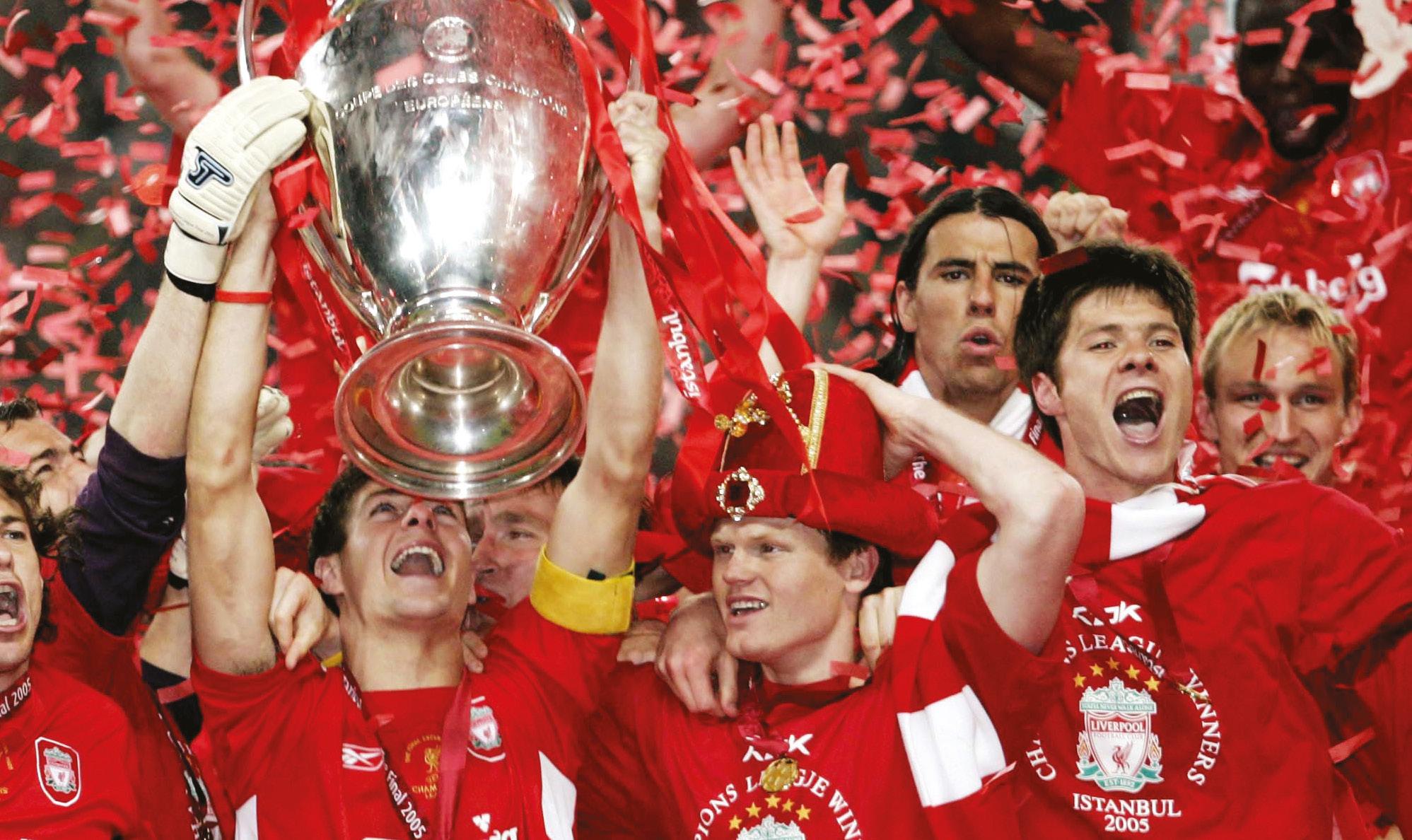
27 League Managers Association
Words: Alice Hoey
ROLE MODEL.
For a team to be successful, it takes not only talented members, but a diverse range of roles that complement one another. We look at one model that’s helping leaders and their teams understand and appreciate their various strengths.

THE MANAGER The Manager Journal 28
Photography: iStock

While their responsibilities will vary according to level and the resources available to them, each leader wears many hats. These include acting as a coach and teacher, a spokesperson and negotiator and, perhaps above all else, a conductor. Bringing together a group of talented individuals is never enough to achieve success, neither even is helping each to play to their full potential. As a conductor, the leader must also be able to weave together each individual performance to create something harmonious, whereby every part is not only in tune, but complements each of the other melodies.
This means ensuring that each individual in your team understands how their particular role is essential to the overall functioning of the team and moves it closer to its goals. That clarity enhances accountability and ownership, gives a sense of value at individual and team level and improves productivity, engagement and job satisfaction. It reduces the chance of overlap, confusion and frustration around tasks and responsibilities, and makes it easier for the leader to direct and motivate the team, to measure their performance and to aid their development.
OUT OF POSITION
But while these benefits tend to be used to describe the formal or position-based roles that people
have in a team, it’s important to remember that we also have informal function-based roles, the spontaneous behaviours that we assume when in a group situation.
Researcher and author Dr Meredith Belbin argued that poorly functioning teams tend to be characterised by an imbalance in these informal role types, which gets in the way of progress and productivity. When too many people in the group have the same strength, for example, it may cause conflict or competition and impede cooperation, while lots of people with a similar weakness will result in poor performance.
NINE KEY ROLES
Belbin’s Team Roles model was developed initially as part of a study of teams at Henley Business School, but later expounded in his books “Management Teams: Why They Succeed or Fail” and “Team Roles at Work”. Belbin defined ‘team roles’ as the ‘tendency to behave, contribute and interrelate with others in a particular way’ and he identified nine that are key to a balanced, high-performing team, describing the key strengths and weaknesses associated with each. He grouped these team roles into Social or People Roles (Resource Investigator, Teamworker and Co-ordinator), Thinking Roles (Plant, Monitor
Evaluator and Specialist), and Action or Task Roles (Shaper, Implementer and Completer Finisher).
The point of Belbin’s model is not to try to assign one of these roles to each member of your team, but to assess which trait behaviours you have in your group and make the most of them, individually and as a team. It might provide some answers as to why a highly talented team is underperforming or why it is proving difficult to get members of the group to communicate or harmonise. The leader can then work with the team to ensure they make the most of each others’ skills, minimise the impact of their weaknesses, manage conflict and help individuals to flourish in the context of the team.
According to Belbin, a team doesn’t necessarily have to comprise nine people, including each role type, as most people will have two or three roles that they are comfortable with, and these may change over time and according to the group situation. While someone might naturally act as a Co-ordinator in one group of people they might fall into the role of Team Worker when in the company of someone with more dominant Co-ordinator traits. Likewise, when working on a new project that requires different skills
The Manager Journal 30 THE MANAGER
BELBIN’S TEAM ROLES MODEL
PEOPLE-ORIENTED
Among Belbin’s three Social Roles, the Resource Investigator can be recognised by their inquisitive nature and ideas generation and are typically outgoing, enthusiastic extroverts who make new contacts easily. They can, however, be over-optimistic at times and lose interest quickly.
Co-operative, perceptive and diplomatic, Team Workers are important in helping the team work together effectively. They tend to have good listening and negotiating skills and, while capable in their own right, put teambuilding first. The downside to this is that they can be hesitant or indecisive when decisions need to be made that may cause conflict or prove unpopular with the group.
A Coordinator, meanwhile, is the archetypal chairperson, confident in setting out what they see as the goals, and delegating work accordingly. They run the risk of being viewed as manipulative, especially if they don’t take on their fair share of the work.
THOUGHT-ORIENTED
Of Belbin’s three thinkingbased roles, the Plant is the creative innovator who comes up with new ideas and approaches. They are often introverted, preferring to work alone, and this can result in them being poor communicators and ignoring given parameters and constraints. Plants thrive on praise and find criticism hard to deal with.
The Monitor Evaluator, meanwhile, is a critical thinker, great at evaluating all the options in a logical and impartial way. According to Belbin’s model, however, such people can be overly critical, slow to make decisions and rather too detached and unemotional to inspire others in the team.
While they can at times overload you with information and dwell on technicalities, Specialists are experts in their field, are highly committed and have real pride in their skills and abilities.
TASK-ORIENTED
Of the three task or actionbased roles, Shapers tend to be dynamic extroverts who thrive on pressure. They possess the drive and enthusiasm to overcome challenges and push through the hard times, which can help to motivate the team as a whole. Weaknesses, however, include a tendency to become argumentative and to cause offence.
As suggested by the name, Implementers are essential in turning plans into action, working in a disciplined and structured way. Reliable and organised, they can also be inflexible and resistant to change.
Lastly comes the CompleterFinisher, a perfectionist who is key when it comes to ensuring a job is done to the right standard. Conscientious in their search for errors, the Completer-Finisher may worry too much at times and take their need for perfection too far.
ROLE MODEL
Cheshire's Luxury Sports Resort


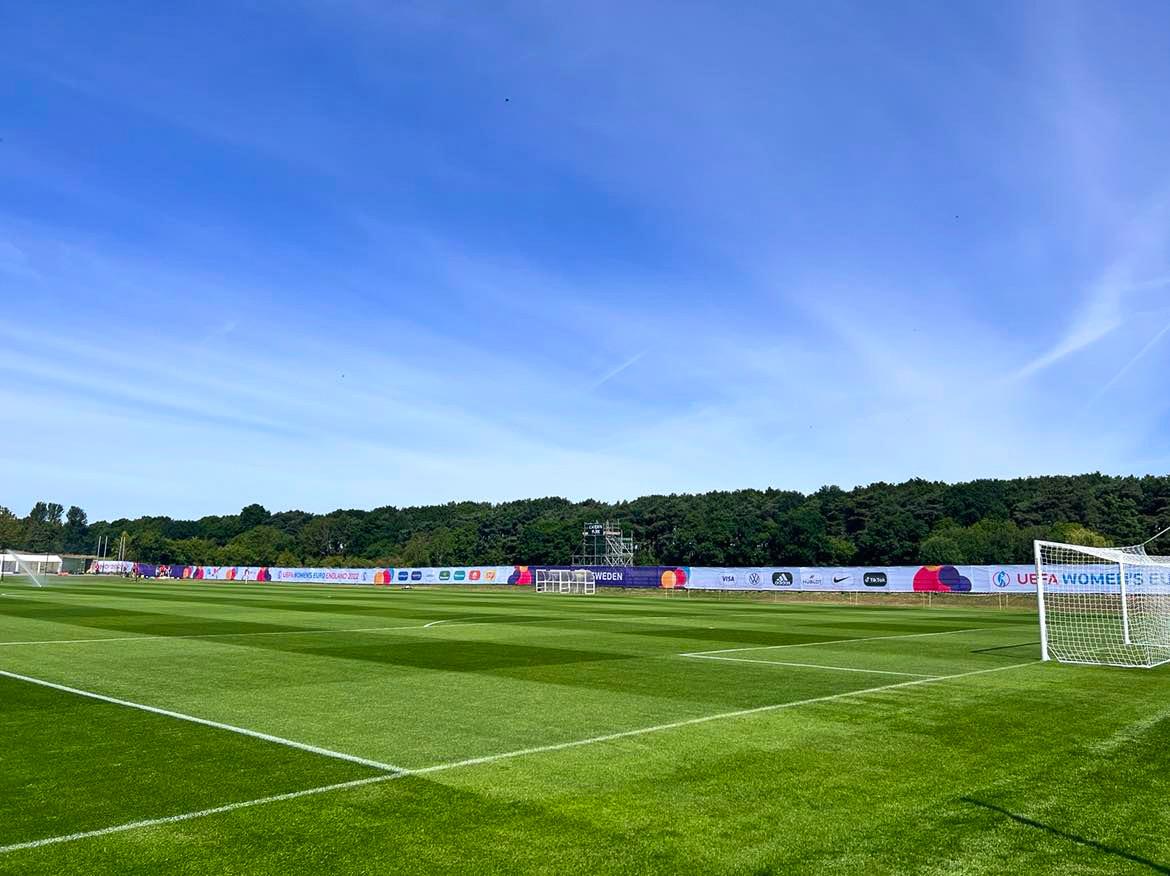

The

Approved, FA-sized football pitch and facilities
bedrooms - championship golf courses - luxury spa - gym & pool - private dining
731555
next-generation venue for football teams to train, relax and reenergise. UEFA
197
01829
and knowledge, someone who normally acts as a MonitorEvaluator might adopt more Specialist behaviours. “Over time, a team member may well mature into more of a leadership or mentoring role,” adds Dr Chris Wagstaff, Reader in Applied Psychology and a Senior Performance Psychologist at the University of Portsmouth, “while staff turnover will change the team dynamics and so also informal roles within the group.”
Wagstaff believes understanding the various informal roles in our teams is something of an untapped resource. “We tend to see these roles come to the fore in particular when things are either really good or really bad, so in times of heightened pressure or stress you might see someone give the side lots of energy and vocal support, while the informal negotiator might step up in times of conflict. The strategist in the group might operate at their best when things are working well for the team.
“By stress testing the team, a leader can gain a better understanding of the behaviours that his or her team members are adopting, but also put people in different roles to develop the diversity of their expertise.”
The real value of Belbin’s
theory for leaders is less as a tool for structuring or restructuring a team, therefore, and more in making the most of who you have. Leaders can opt for a full Belbin Team Roles test or start smaller with what he calls a Team Role Circle. Here, working in small groups, individuals choose the two team roles they most identify with and then discuss and analyse the findings as a group. Ultimately, the aim is to work together to decide on positive action points that will enable the team to be more effective.
“We need a shared understanding, going deeper than just thinking in terms of formal roles to think about people’s preferences, life stories, and what they bring to the table in terms of team dynamic and culture,” says Wagstaff. “Having these overt conversations raises each other’s awareness of the roles they are fulfilling, or think they’re fulfilling, and where there are gaps or misunderstandings. This awareness is important because the behaviours we display are driven by what we perceive our role to be and how that fits with the roles of others.”
Ultimately, the challenge of the leader is to understand the diverse role behaviours in his or her team and conduct them to create something harmonious and high performing.
As a conductor, the leader must also be able to weave together each individual performance to create something harmonious, whereby every part is not only in tune, but complements each of the other melodies.
League Managers Association 33 ROLE MODEL
Words: Alice Hoey
Photography: Reuters // Action Images // Alamy
MARIEANNE SPACEY-CALE MBE
THE PATIENCE OF THE SAINTS.
Four and a half years after being denied a licence to join the FA Women’s Championship, Southampton FC Women got there on their own steam. Here, Head Coach Marieanne Spacey-Cale MBE talks about achieving that goal and then setting the bar even higher.
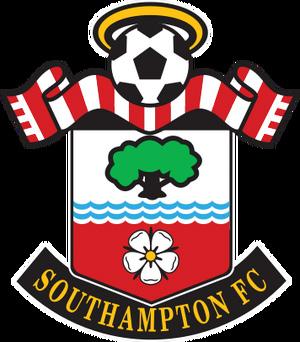

The Manager Journal 34 THE MANAGER
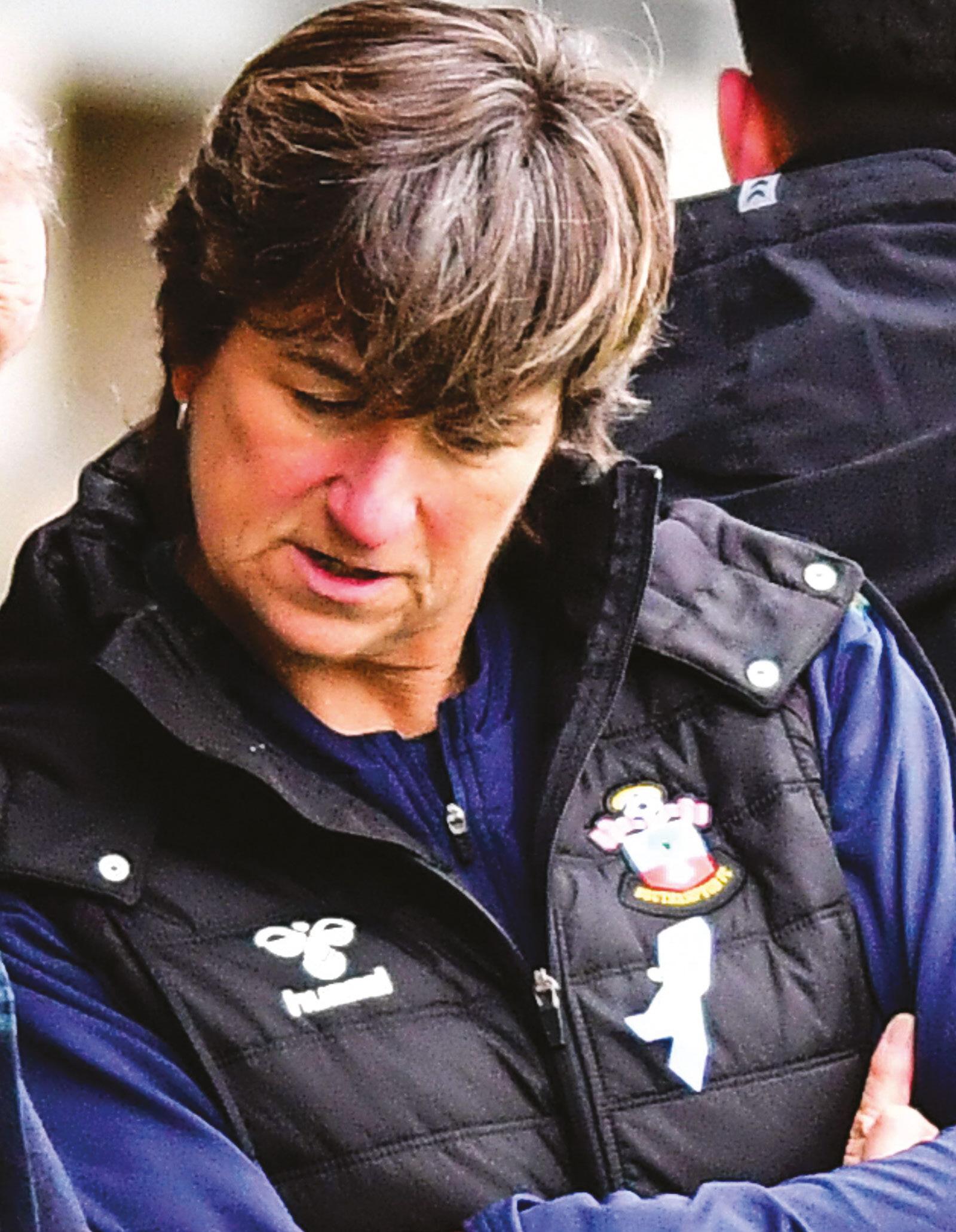 Manager Marieanne Spacey-Cale MBE (Southampton FC Women) discusses tactics during a Barclays FA Women’s Championship League game.
// Alamy
Manager Marieanne Spacey-Cale MBE (Southampton FC Women) discusses tactics during a Barclays FA Women’s Championship League game.
// Alamy
After a long and successful playing career, which included 91 appearances for England, Marieanne Spacey-Cale turned her hand to coaching in 2003, starting at Fulham Ladies before moving to AFC Wimbledon Ladies. Despite the wealth of experience that followed, it was her early days at Fulham that Spacey-Cale remembers as being the toughest and most formative of her 20-year career. As well as kickstarting her professional development, it was a period that was to shape her whole view of coaching.
“I’d completed my coaching badges towards the end of my playing career, had experience of working with kids and had held some adult sessions, but I had no real idea of what it meant to coach day in, day out at a women’s club,” she says. “It hit me like a steam train.” While she says she made her fair share of mistakes in that early period, it was important for her development. “It helped me to grow and learn how to really coach, off the pitch as well as on it.”
In the years that followed, Spacey-Cale continued to develop and gain experience, working with the England girls youth sides, coaching at Arsenal and Charlton, and acting as Assistant to then England Manager Mark Sampson, including being part of the
coaching team at the 2015 FIFA Women’s World Cup. Two years later, acting as Head Coach to the England U23s, Spacey-Cale led her young side to victory in the Nordic Women’s Football tournament in Sweden.
LAYING FOUNDATIONS
Spacey-Cale joined Southampton FC Women as Head Coach and Head of Women and Girls Football in July 2018 with the aim of steering them towards their goal of playing in the FA Women’s Championship. When the team’s application to join the newly renamed Championship (previously WSL 2) was rejected by The FA, it served only to unite the team and their new manager, and reinforce their determination.
“We knew that we could either allow ourselves to wallow in disappointment or use it as a positive driver,” says SpaceyCale. “We asked ourselves what it would take to be one of the top women’s teams in the country, and then spent the next three or four years putting in place everything we would need to achieve that in a sustainable way – building the necessary infrastructure, working on our vision and values, and recruiting talented players and staff who were aligned with that philosophy. We wanted to ensure that the team would have the best facilities and
// Action Images
The FA Women’s Cup Final, 5th May 2003: Fulham’s Marieanne Spacey-Cale is challenged by Charlton’s Eartha Pond. Reuters
THE MANAGER The Manager Journal 36
We asked ourselves what it would take to be one of the top women’s teams in the country, and then spent the next three or four years putting in place everything we would need to achieve that.

We’ve aspired to be in the Championship for the past four years, and now we’re here we’re determined to consolidate our position and continue our growth.
Barclays Women’s Championship game between Southampton FC Women and Charlton Athletic Women at St Mary’s Stadium, 20th August 2022.
 // Alamy
// Alamy
The Manager Journal 38
support possible on their journey upwards through the leagues. In essence, that early setback gave us the time we needed to put all that in place.”
Spacey-Cale’s first season with Southampton saw the team take the double, finishing top of the Southern Region Premier Division and winning the League Cup, while the following two seasons they topped the FA Women’s National League Division 1 South West. After successfully applying to move up to the FA Women’s National League Southern Premier Division for 2021/22, they proceeded to win that too, earning promotion to the Championship in the play-offs.
“We’ve aspired to be in the Championship for the past four years, and now we’re here we’re determined to consolidate our position and continue our growth,” says Spacey-Cale. “We don’t just want to survive, we want to thrive.”
LEADING THROUGH CHANGE
It has been, however, a period of major adjustment for everyone involved, and not only in terms of the level of competition the side is now facing, week in, week out.
“The girls went full time for the first time this season, so we’ve all had to adjust to a new programme, with daily, weekly and monthly schedules to plan
and prepare,” says Spacey-Cale. “This period of adjustment will continue throughout the season, as we keep reflecting on what’s happened and adapting to what’s in front of us. We’re not just working in isolation, though,” she adds. “Everything we do sits in the wider context of our ultimate goal – to be up there with the best teams in the country in the Women’s Super League.”
Spacey-Cale makes no apologies for this ambitious long-term plan, but as an on-pitch goal it tells only half the story. “Off the pitch, we want to ensure that the player pathway, which has always been so successful at Southampton, continues to be so for the women’s side, so that the talented players we have at 12, 14 and 16 years old stay with us. A home-grown club,” she says, “is synonymous with home-grown talent.”
THE BIG PICTURE
To ensure the side’s growth and development is ongoing and holistic, each year Spacey-Cale, the players, support staff and the Director of Football populate a ‘goal tree’ with objectives that they agree together. “This has six pillars, covering areas like our performance on the pitch, our physical performance, how we’re inspiring the local community, building the fanbase and enabling accessibility to our players so they can be role
models,” explains Spacey-Cale. “Every year we have different targets to achieve, and we review them every six-to-eight weeks to see how we’re doing against those objectives.”
With a 20-year career in coaching spanning arguably the most important period in the women’s game, Spacey-Cale is a big believer in the need to raise the game both on the pitch and off it.
“In recent years, the spotlight has really been on the football and making it a great game to watch,” she says, “and fantastic progress has been made in that respect. It was brilliant, for example, to see the number of people coming to watch matches during the Euros. What’s particularly important now, as the game continues to move forward, is that the players get as much support as possible in areas such as clinical and performance psychology, injury, diet and nutrition. We need more research into medical and performance research so we can understand better what female players need, physically and mentally, to compete at this level.
“Essentially, it’s about paying attention to their holistic development, rather than just focusing on what happens on the pitch. There’s so much more to coaching than the 90 minutes of a football game.”
MARIEANNE SPACEY-CALE 39 League Managers Association
Words: Alice Hoey
Photography: Reuters // Action images
TO SPEAK OR NOT TO SPEAK…
According to Paddy Harverson (Communications Secretary for then Prince Charles, now King Charles III, and, before that, Communications Director at Manchester United) it’s always better to have some kind of relationship with the media. There’s also an art to knowing when to share and when to keep quiet.

INTERVIEW
THE MANAGER The Manager Journal 40

League Managers Association 41 THE MANAGER
Authenticity is often touted as one of the key communication qualities of an effective leader. Essential in building trust and respect, it is perhaps authenticity, alongside integrity and honesty, that we most want to see in those holding positions of authority.
However, given that as a leader you will represent not just your own personal brand, but those of your team and organisation, you cannot always assume that you can, or should, speak your own mind and be true to yourself. While it’s by no means a problem faced uniquely by those in sport, it is a field in which people hang off every word you say, so knowing when to say something, what to say, and how to say it, is paramount.
When the manager of a sports team attends a press conference, they sit opposite a bank of microphones knowing that their words will not only provide discussion for the fans over lunch or a pint. They will also reverberate around the office and dressing room, be noted earnestly by the club’s senior board and possibly be picked up on by a potential future employer or future hires. When you have multiple audiences to satisfy, and need to be many things to many people, remaining honest and authentic can be a difficult skill to master.
Having been media adviser to
one of the most high-profile people in the world – the then Prince of Wales, now King Charles III – PR executive and former journalist Paddy Harverson knows a thing or two about the importance of authenticity.
“It sounds like a cliché (because it is), but my advice is always to be yourself,” he says, “because when you deliver words that someone else has written or that you don’t believe in, or you try to play a part, it’s rarely convincing. And once people stop believing in you, communication breaks down.”
Harverson acknowledges, however, the challenge facing leaders in the spotlight. “In an ideal world, you would deliver messages that worked for all your various audiences,” he says, “but in reality there are things in certain circumstances that you might want to speak honestly about that could go down badly with one group but well with another, so you have to tread carefully. Unfortunately, and understandably, what this then leads to is excessive caution –where you play it safe and so end up coming across as bland and uninspiring, because in an effort to avoid controversy you say little at all of interest.”
It’s a challenge, he says, that takes experience to overcome, but also discipline in going into
any press conference or briefing knowing exactly what you want to say and who you want to reach with your message. On occasion, it also requires the courage to deliver a message, maybe a harsh truth, that you know won’t please everyone but needs to be said.
CHANNEL IN
Back in the day, media conferences, interviews and carefully considered press statements were the only means by which a leader could convey such messages. Today, in contrast, it is possible for anyone to air their thoughts and grievances, or to share information about their professional and private lives, in just a few clicks and swipes. Some people have even built their entire personal brands around this open and transparent approach, but it’s one, says Harverson, that carries considerable risks.
“Over the years, I’ve known various people who, at points in their life, have shared information about their family or personal stories on social media and who have come to regret it. When you volunteer information about your private life people feel they have a licence to intrude into that space, even if only in what they write about or the questions they ask. Once you open that door, you can’t close it again.”
The Manager Journal 42 THE MANAGER
His advice to clients, therefore, is always to keep their private lives just that, unless there is something of direct relevance to a particular issue that is already in the public domain, or to their professional capacity. But that doesn’t mean you should shut out the media completely, especially when it comes to your professional role and obligations.
“I can think of very few examples where not engaging with the media works as a longterm strategy,” he says. “I like to say the media is like the weather; it will always be there – you can’t make it go away, or refuse to acknowledge it. You just have to keep an eye on the forecast and enjoy the sunshine when it comes out, but know that at some point it’s going to rain (so always make sure you have an umbrella handy).”
A former journalist for the Financial Times, Harverson is a great believer in the role of the media and the importance of a free press. “In sport, for example, journalists are there to ask the questions the fans would want to ask,” he says, “and I think that, whether you’re in sport or another sector, you have a duty and responsibility to communicate as a leader. It comes with the job.”
When you engage with the media in the right way, it can also be a useful tool, he adds.
“It can be a distribution channel for what you want to say, to reach the people you want to reach, to influence, inspire and inform. Which means you should always try to build a working relationship with journalists, and in some cases a really friendly one. It is always worth remembering that football writers and broadcasters are fans too, that they share your passion and enthusiasm.”
NEXT QUESTION, PLEASE
There are, of course, situations when it’s better not to engage, when silence itself can be an effective tool. And there’s certainly an art to saying nothing. “I don’t like advising anyone to say ‘no comment’, because those words tend to shut down communication and make you appear defensive and obstructive.
“As a leader, it’s important to convey a command of the situation you’re in, and you want what you’re saying to come across as open and confident, not fearful or defensive. There are ways of doing that skilfully, honestly and with humility and humour, both of which are powerful tools in communication.
“For example, when asked about something difficult, perhaps to do with the business or ownership side of a club, you might say with a wry smile, ‘I’m
I think that, whether you’re in sport or another sector, you have a duty and responsibility to communicate as a leader. It comes with the job.
League Managers Association 43 PADDY HARVERSON
Are you worried about yourself, a
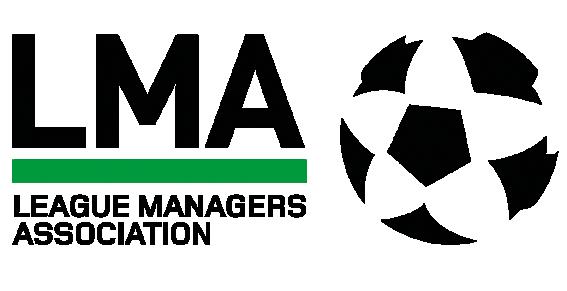
a family
or a colleague? Ask Eve
If you have concerns or would like any information on the five gynaecological cancers (ovarian, womb, cervical, vaginal, and vulval), you can contact The Eve Appeal’s nurse-led specialist gynaecological health information service. We now have translation services available, so you can talk to one of our nurses about gynae health concerns in over 250+ languages.

Phone: 0808 802 0019*
Email: nurse@eveappeal.org.uk
Website: www.eveappeal.org.uk/nurse
*Free to call from landlines and mobile phones within the UK and does not appear on itemised bills. The Eve Appeal 2023 Gynaecology Cancer Research Fund (Trading as The Eve Appeal). Registered charity no. (England & Wales) 1091708. Registered charity no. Scotland SC042612. Registered company no. 4370087
Proud partners of the League Manager’s Association
friend,
member,
Paddy Harverson
Since leaving the Royal Household in 2013, Paddy Harverson has been Co-Chairman of Milltown Partners, a global advisory firm he co-founded that advises influential organisations and individuals on communications, public policy and reputation management.
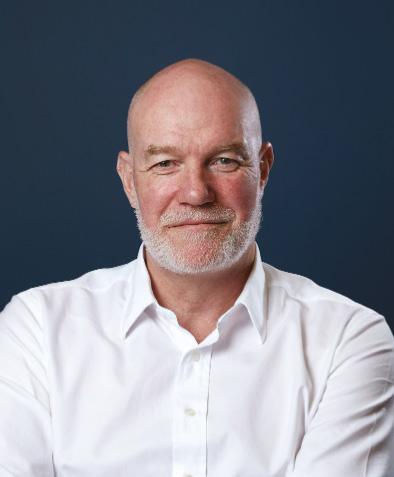
afraid that one’s above my pay grade’ or ‘that’s well outside of my comfort zone!’. That tends to be much better received than simply stiffening up, verbally and in your body language, and saying, ‘sorry, no comment’.”
Whether you choose to speak out or artfully avoid commenting on an issue, your personal brand is, ultimately, shaped more by what you do than what you say. Managing a personal brand successfully, therefore, means considering at all times your behaviours and what they say about your values, not only during life’s peaks and troughs, nor only in terms of your day job.
“The key,” says Harverson, “is to have a clear understanding of yourself and a strong vision of what you want to achieve and how you want to achieve it, not just in work but in life. It’s also important to think about what you want to be known and remembered for, beyond professional achievements. Think about the impact you want to have, and the purpose and values that drive you. If you can understand that, and if you’re consistent in how you treat people and go about your work and everything outside of it, then you will build a brand that is positive, authentic and totally believable.”
The key is to have a clear understanding of yourself and a strong vision of what you want to achieve and how you want to achieve it, not just in work but in life.
PADDY HARVERSON 45 League Managers Association
Words: Alice Hoey
Photography: Reuters // Action Images
KEY TAKEAWAYS
KATIE MOBED
FOSTER A CULTURE OF BELONGING.
In a recent LMA Masterclass Katie Mobed shared her thoughts on the importance of psychological safety in high-performance cultures.
The Manager Journal 46 THE MANAGER
CULTURE IS NOT JUST WHO YOU ARE.
Nor is it what you stand for. It’s what you say and do, the signals you send out to your team, the behaviours and standards you have committed to together. As a leader you need to send out signals continuously to the team that they belong, that although you have high expectations of them, they’re safe. Whether that’s how you sign off an email or greet people, or being honest about your own mistakes and vulnerabilities, it can all help to build psychological safety.
PSYCHOLOGICAL SAFETY TAKES THE
BRAKES OFF PERFORMANCE.
Many factors are involved in
creating a high-performance culture, but the number one factor that differentiates high-performance cultures is psychological safety. That means feeling able to be yourself in your organisation and culture, to take risks, admit when you’ve done something wrong or you need help or support, and being able to do or say the wrong thing without fear of punishment. When you have that it removes some of the interference you get when you bring people together.
WE’RE WIRED TO FEAR SOCIAL EXCLUSION. While our environment is now very different to when we were cavemen, there’s a lot in terms of our brain functioning
that hasn’t changed much. The amygdala, in the limbic system, is constantly scanning for danger, and that includes social danger. If as a caveman you didn’t fit in with your tribe and were rejected, your chances of survival would be far lower, making belonging a critical need. When we join a team, therefore, we are on high alert as to whether we fit in, whether we can contribute and help it to succeed.
LEADERS MUST CREATE A SENSE OF BELONGING. Rather than seeing a new recruit’s first day as a box-ticking exercise whereby you ensure they have everything they need and know where everything is,

League Managers Association 47



411 rooms and suites | Overlooking Hyde Park | Pet-friendly Award-winning Nipa Thai | Signature Afternoon Tea Meeting & event spaces | Studio 19 virtual events DISTINCTIVELY ROYAL Royal Lancaster London, Lancaster Terrace, London, W2 2TY +44 207 551 6000 | royallancaster.com
About Katie
Performance Psychologist Katie Mobed has worked with some of the world’s best athletes, leaders and organisations, helping to train the mindset skills and practices essential to thriving under pressure.

Her clients include CEOs and educational leaders, and she has worked closely with Team GB for the last decade, supporting many of its most successful athletes and coaches.

use it as an opportunity to really celebrate that individual and help them feel part of the team. On your first day at Apple you get a notebook with a personalised message about why they’re so thrilled to have you on board and what they’re looking forward to you bringing to the team.
VULNERABILITY CAN BE VERY POWERFUL. Leaders should own up and speak out when they’ve done something wrong or when they would appreciate support or feedback. The best leaders I work with regularly ask their teams, ‘What’s the one thing I do that you’d like me to do more of’, and ‘What’s the one thing you want me to stop doing that would make a difference to the team?’ The message is, it’s OK to be learning and to make mistakes. We don’t have to hide our weaknesses from the team or sweep them under the table, where they may lead to bigger issues further down the line.
MOST HIGH-PERFORMING CULTURES ARE NOT COMFORTABLE PLACES. Being positive to, and about, one another is important in teams, but that doesn’t mean we have to shy away from honest conversations. The amount of candour and honesty required for a culture to be successful is significant. Importantly, there’s a difference between comfort and safety. In a high-performance culture, you know that the organisation cares about you and that you’re connected, so you can tolerate much harder, tougher and more direct messages.
IT’S NEVER FIXED OR DONE. It’s a continual process of managing the dynamic of being at the same time supportive and challenging, of being really in the here and now, while still holding a vision for the future. It’s important that leaders support one another in that, because while creating a high-performance culture is a challenge, the rewards are massive.
League Managers Association 49 KEY TAKEAWAYS: KATIE MOBED
Being positive to, and about, one another is important in teams, but that doesn’t mean we have to shy away from honest conversations.
Words: Alice Hoey

Photography: Reuters // Action Images
FROM ANOTHER SPORT: THE MANAGER
A MAN OF THE WORLD.
During a career spanning nearly three decades, John Mitchell has coached in six countries and for the national teams of five, including England twice and his home side, the All Blacks. Here, he shares just some of what he’s learned.
JOHN MITCHELL The Manager Journal 50
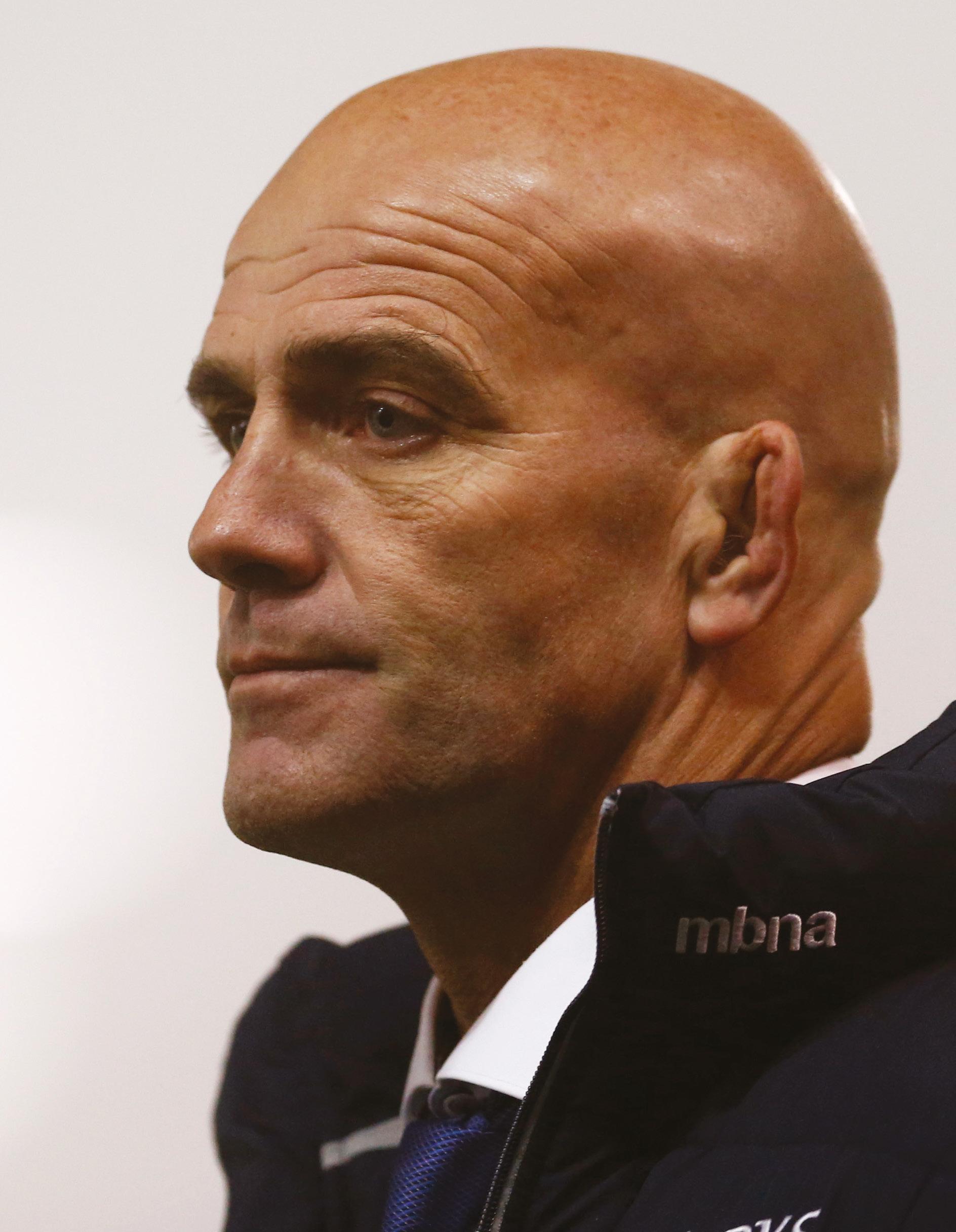
MY FIRST JOB ABROAD REALLY OPENED MY EYES.
I moved from New Zealand to Ireland in 1996 to take up the role of Technical Advisor with the national side. It wasn’t a huge deal for me on a personal level – I’d been sent away to boarding school as a kid and had travelled in my youth to France – but it was an eye-opener professionally. I was coming at it completely from a New Zealand rugby perspective, with which I’d seen a lot of success, so I guess as a young coach I was pretty set in my ways. I thought I knew the formula for success, and I stuck to that. Over time, however, I realised that the team I was working with had its own strengths, weaknesses and style of play, and I couldn’t simply apply those tried and tested methods. An experience like that challenges all your ideas and approaches, but it’s valuable because it forces you to reflect, and to change and adapt.
I WAS SOMETHING OF A PIONEER WHEN I JOINED THE ENGLAND COACHING TEAM.
It wasn’t common at that time for a foreigner to coach another national side, and I couldn’t get my head around it at first; I actually called a friend to see if I should take the role. You don’t have long to make a difference with a national side, so you have to know exactly
what you want to achieve in your time with the players and be very focused in how you do that. Whereas you get two chances to play each team in club rugby, and can adapt your approach the second time around, at international level you only get one shot at it, so you have to be ready.
I’VE ALSO COACHED NEW ZEALAND AND THE US AND AM NOW COACHING JAPAN. Working at the top of the game periodically throughout my 29year career has given me a real insight into how approaches to coaching have changed over the years. More than ever, the focus is now on developing versatile players who are capable of anticipating and adapting during a game. Aided by the huge amount of data now available as evidence, we’re also better able to identify opportunities for the team, so they can go after them. What’s especially important to me, though, is to give more individual feedback to players, and to be able to identify the barriers preventing them from taking their game to the next level. That means helping them to change their behaviours and open their minds, but also improving their communication and observational skills. That’s something some younger players, who spend so much time on screens, can find challenging.
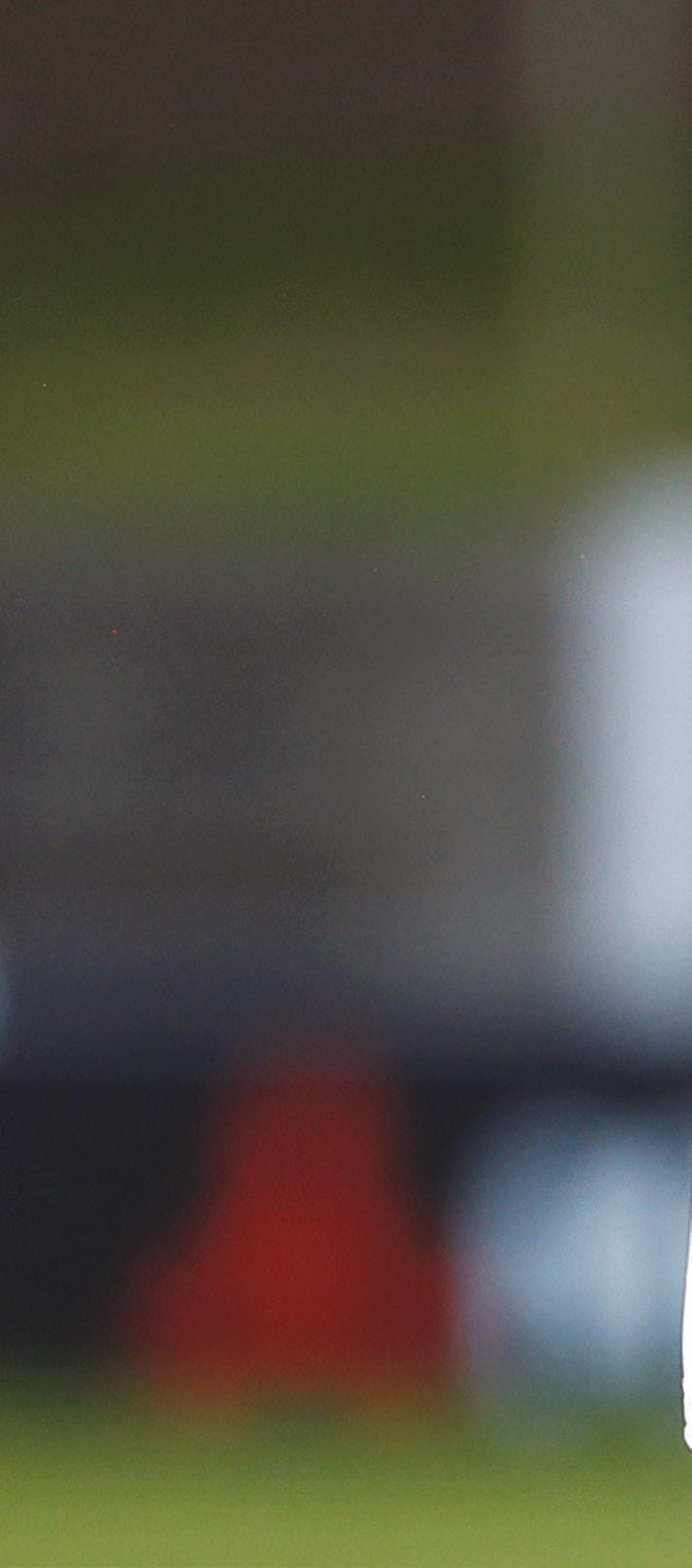
You don’t have long to make a difference with a national side, so you have to know exactly what you want to achieve in your time with the players and be very focused in how you do that.
The Manager Journal 52 THE MANAGER
England Defence Coach John Mitchell with then Head Coach Eddie Jones. Reuters // Action Images
I WAS ONLY 37 WHEN I BECAME HEAD COACH OF THE ALL BLACKS.
I made some very good decisions as well as some mistakes during my time with the side, and I learned a huge amount in the process. As a young coach I was keen to be seen to be looking forward and implementing positive changes, focusing on performance and trying to control what I thought I could control. This included trying to create a more fun environment for the players, one where they
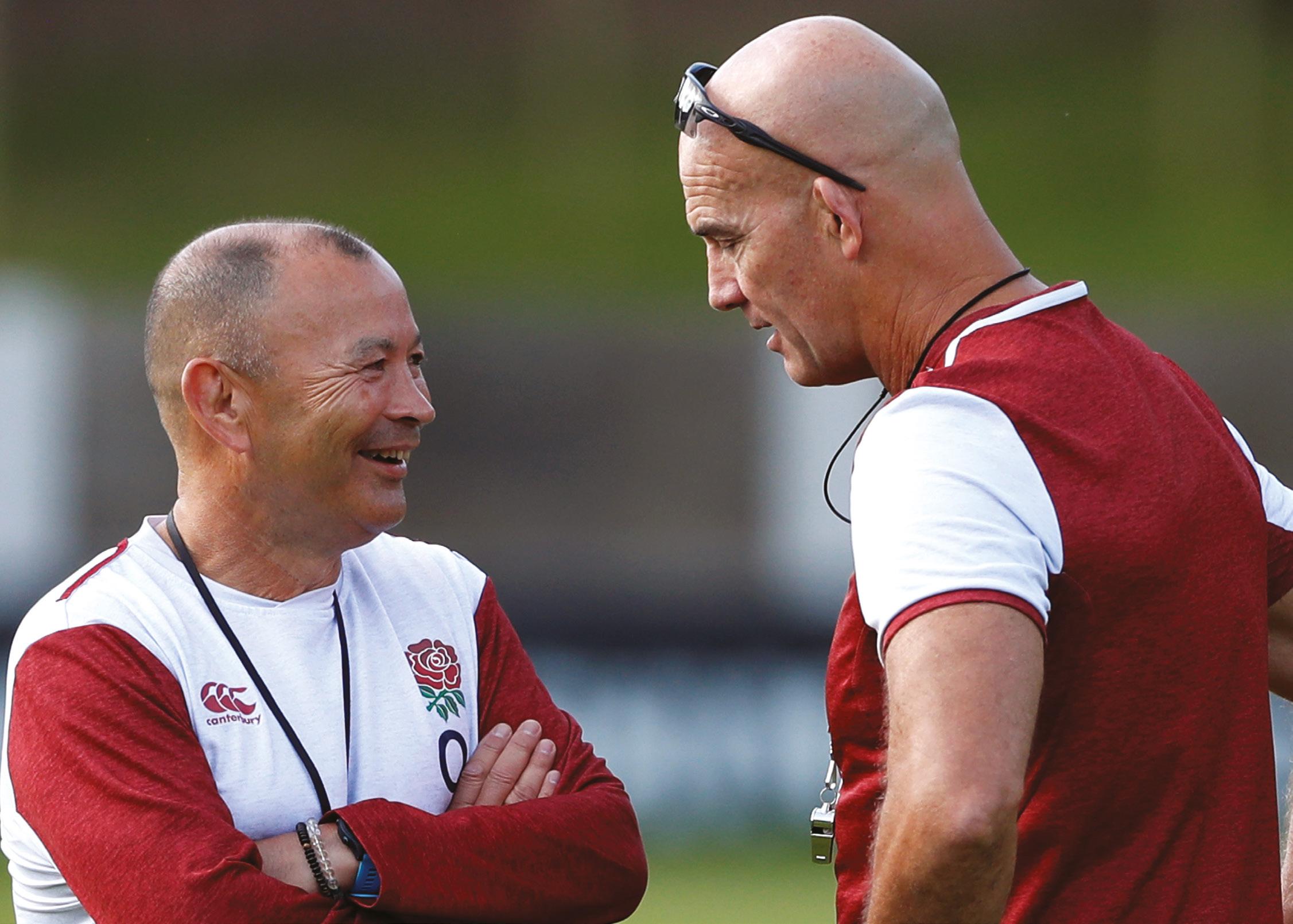
felt safe to speak to me and to seek support, and for all of us to be proud of the style of game we were playing. But we also had to be consistent and win games, and I had only a short two-year period to prove we could do that.
MANAGING UP WAS NOT A PRIORITY FOR ME.
I found that part of the job particularly tough. We went through three CEOs and a change of board during my tenure, so it was a challenging
time to be part of the organisation. Managing up was one area I didn’t feel very well equipped to deal with at the time, because it was something I couldn’t control or influence, nor did I have much time to give to it; I was focused totally on team performance. When we didn’t get the outcome we were hoping for in the 2003 World Cup my leadership was challenged; they questioned my ability as a head coach to balance all the balls that were expected in the role.
League Managers Association 53

54 The Manager Journal
Over the years I think I’ve become pretty good at reading people, at telling whether or not they’re receptive, engaged and interested in giving what you’re saying a go.
THE NEXT FOUR YEARS WERE THE TOUGHEST AND MOST FORMATIVE IN MY CAREER.
I was really hard on myself after I was let go from the All Blacks. I dwelled for a long time on why we didn’t get the right outcome and what I could have done differently. I really took responsibility for it. One day, much later, I was confronted with a fellow coach who’d had an even tougher experience with the All Blacks than me; family and friends were basically trying to uplift me as a result of some else’s failure. It took that conversation with myself for me to gain some perspective and get my life on track. Looking back, I could have sought out more support during that period. At the time, it wasn’t the done thing to ask for help, but thankfully there’s now more support in terms of mental skills and mental health.
IT’S IMPORTANT TO CREATE SAFETY FIRST FOR THE PLAYERS, BEFORE CREATING CHASE AND CHALLENGE. I believe trust is built in small moments, and not even in the context of rugby. It may never happen. That doesn’t mean you don’t target a chase or challenge them, but the players need to know that they can talk to you about anything, any time. The informal chats that happen in the corridor or over a coffee are so valuable, but it’s important, too, to know when is the right
time to talk. There are times when you might want to discuss something with a player, but their body language tells you it’s not the right time. They might be too flustered or distracted for the serious conversation you need to have with them. Over the years I think I’ve become pretty good at reading people, at telling whether or not they’re receptive, engaged and fully interested in giving what you’re saying a go. Often, their eyes tell you more than their words.
THE JAPANESE PEOPLE ARE OBEDIENT AND WORK VERY HARD.
Although I’d spent time in Japan on two previous occasions, I’d never got to know the culture as deeply as I have now. Working as Defence Coach, I’ve learned that the people here need to be clear on their roles, can be quite perfectionist in nature and are very focused on doing their particular jobs well. That can make them a little rigid in their thinking, but this is a fluid, unstructured game we’re working in, so the ability to work off the ball and anticipate what’s next is critical. Sometimes as a player you might have to fill a weakness in the team to make it stronger, and that might go outside of the specific role you knew you had to play. My challenge, therefore, is to help the players be more aggressive and bold. If we can meet that challenge we know the reward will be far greater and more satisfying.
John Mitchell directs the All Blacks at the Collingwood AFL ground in Melbourne, 18th November 2003.
JOHN MITCHELL 55 League Managers Association
Reuters // Action Images
Five reasons why looking after your staff is good for everyone
Given everything that’s going on in the world right now, there has never been a better time to make health and wellbeing a priority within your business.
Amid a cost-of-living crisis and following the topsy-turvy working practices of the pandemic, the mental, physical and financial health of us all has been affected.
Productivity is down 39% since 2019, according to the UK’s largest employee wellbeing survey, Britain’s Healthiest Workplace – and this has come at a total cost of £127.9bn to the UK economy in 2022.
Caring for your staff is clearly better for them. But it also carries significant benefits for your business and society too by helping the UK to perform at its peak. Here are five reasons why it’s a good idea.
1. Staff expect to be looked after Attitudes to wellbeing at work have changed. According to a recent report published by CBI and Vitality, a staggering 82% of UK office workers believe companies have a greater responsibility to support the mental health and physical wellbeing of their people following the pandemic1. These days it can no longer be ignored.
2. Low productivity is bad for business
With one in five employees suffering from burnout, businesses are typically losing 93 productive days per employee as a result. Meanwhile, those who report symptoms of depression (10%) are impacted even more, with 110 productive days per employee lost on average each year. Roughly double the average loss compared to employees not at risk of poor mental health2. None of this is helpful to your business.
3. It shows that you care
Bosses that do provide health and wellbeing support are able to offer a tangible demonstration that they’re looking after their people. This is not only good for staff, but it can also provide obvious benefits to the business and help society too, by making people
healthier, more productive while easing our burden on the NHS.
4. They’ll thank you for it
Positive lifestyle choices not only mean healthier, more productive staff (less likely to get sick). They’ll be happier too. But as we all know, making healthy decisions is not always easy. It helps if they are nudged along with the right rewards and incentives. Furthermore, fast, seamless access to healthcare – including private GPs and mental health services – is also more in demand than ever. At a time when recruiting top talent is at a premium, all this carries significant staff retention benefits for businesses.
5. It doesn’t need to cost a fortune
The good news for business owners is that comprehensive and highly engaging health and wellbeing solutions can be delivered all in one place. And they do not need to cost a fortune. Even before a claim needs to be made, there are a whole host of benefits to unlocking health and wellbeing at work through a single, digital-led solution that staff members genuinely value. Making people healthier and more productive is good for everyone – not just your business.
The Vitality Programme is the world’s largest behaviour change programme linked to insurance. Find out how Vitality can provide your staff fast, seamless access to healthcare and support the physical and mental wellbeing of your business through a range of rewards and partners at www.vitality.co.uk/business/health-insurance
1 Healthy Hybrid Working, A Blueprint for Business, CBI and Vitality, 2022.
2 Britain’s Healthiest Workplace survey, Vitality, 2022. | J7713_02/23
LMA NEWS.
THE MANAGER
League Managers Association 57
LMA EVENTS & CORPORATE ACTIVITY.
01 GRS Football Tournament
The LMA hosted a corporate football tournament for partner GRS at St. George’s Park.
LMA Ambassadors Ian Baraclough, Chris Hughton, Michael Johnson, René Meulensteen, Garry Monk, Leam Richardson, Craig Shakespeare and Chris Wilder each managed a 7-a-side team, followed by a Q&A over lunch.

01
The Manager Journal 58

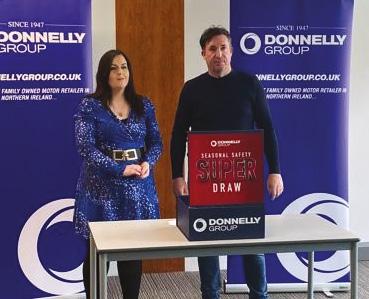




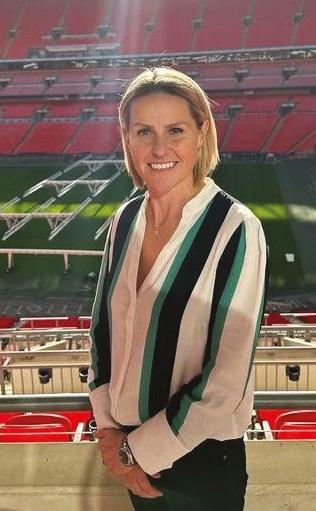 02 LMA Ambassador Kelly Smith MBE took part in a Q&A for students and alumni at UCFB’s Wembley Campus.
03 LMA Ambassadors Paul Merson and Mick McCarthy attended a private dinner with Anglian at The Gherkin in London.
04 LMA Ambassador and Newcastle United Manager Eddie Howe took part in a content interview for UCFB at the Newcastle Training Ground.
05 LMA Ambassador Ian Holloway hosted two grassroots coaching sessions at Bristol Rovers Junior Supporters Club, on behalf of Utilita Football, and supported Utilita’s Football Rebooted campaign.
06 LMA Ambassador Sam Allardyce took part in a Q&A for students and alumni at UCFB’s Etihad Campus.
07 LMA Ambassador Robbie Fowler took part in the Donnelly Group Aftersales Super Draw on behalf of the LMA and Castrol.
02 LMA Ambassador Kelly Smith MBE took part in a Q&A for students and alumni at UCFB’s Wembley Campus.
03 LMA Ambassadors Paul Merson and Mick McCarthy attended a private dinner with Anglian at The Gherkin in London.
04 LMA Ambassador and Newcastle United Manager Eddie Howe took part in a content interview for UCFB at the Newcastle Training Ground.
05 LMA Ambassador Ian Holloway hosted two grassroots coaching sessions at Bristol Rovers Junior Supporters Club, on behalf of Utilita Football, and supported Utilita’s Football Rebooted campaign.
06 LMA Ambassador Sam Allardyce took part in a Q&A for students and alumni at UCFB’s Etihad Campus.
07 LMA Ambassador Robbie Fowler took part in the Donnelly Group Aftersales Super Draw on behalf of the LMA and Castrol.
02 07 03 05
04 06 League Managers Association 59
08 LMA Ambassador Jody Morris took part in a Castrol Q&A ahead of the Chelsea match against Fulham at Stamford Bridge.
08
LMA INSTITUTE OF LEADERSHIP AND HIGH PERFORMANCE.
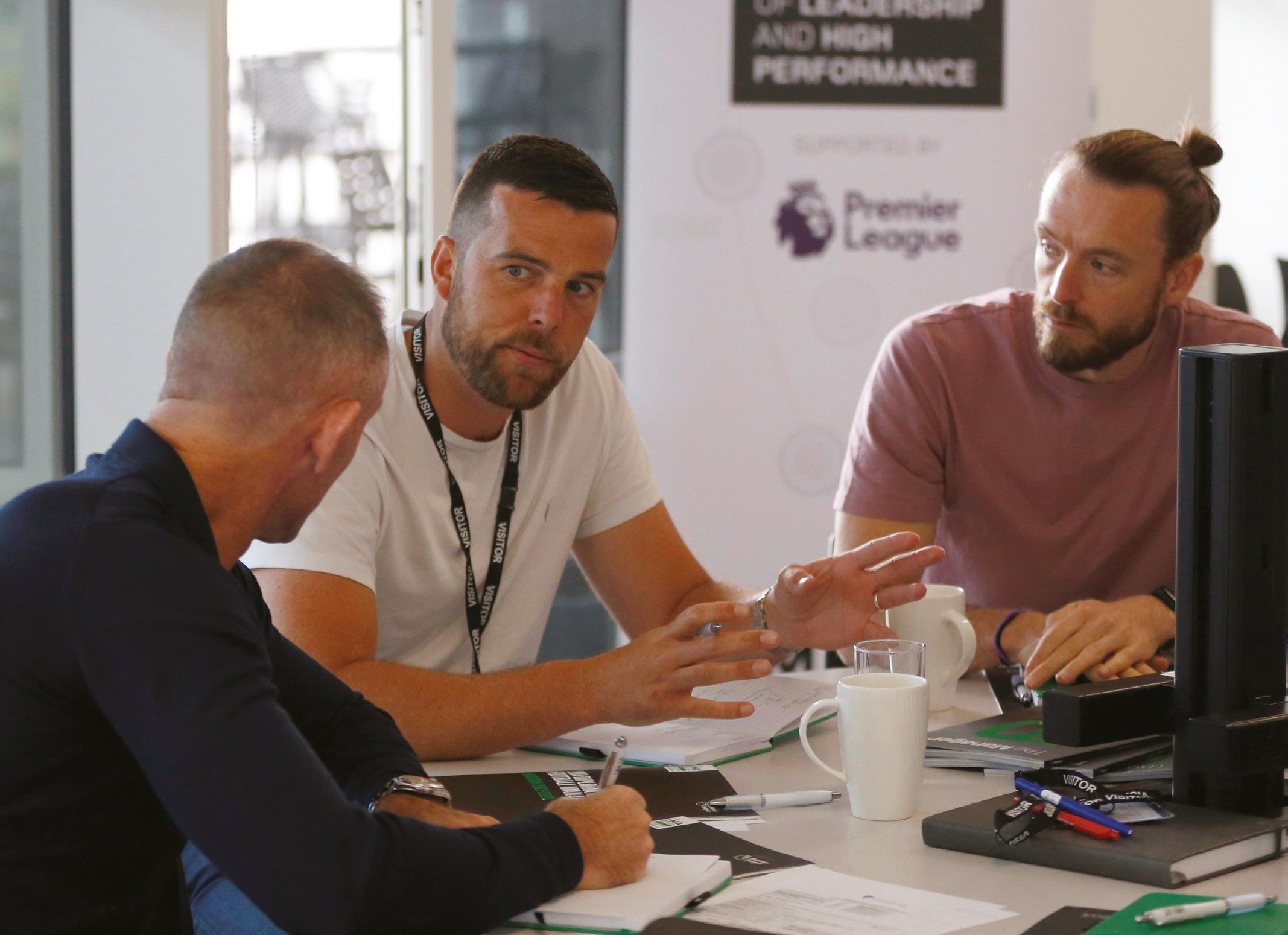
01 The Manager Journal 60
01 LMA Diploma in Football Management
The 2022/23 LMA Diploma in Football Management continued with in-person sessions at St. George’s Park on Diversity, Equality and Inclusion, and Football Finance. Individual online sessions with Brightness Media, meanwhile, focused on developing a media strategy.
02 LMA Diploma Graduation
Congratulations to the 2021/22 LMA Diploma in Football Management students who graduated in December.
The graduation ceremony was held at the University of Liverpool, where students and their families celebrated together alongside course alumni.

03 LMA Masterclass: November

The second LMA Masterclass of 2022/23, held at The Hawthorns Stadium, was led by Professor Keith Davids, Dr Joe Stone and Dr Martyn Rothwell from Sheffield Hallam University. The trio focused on
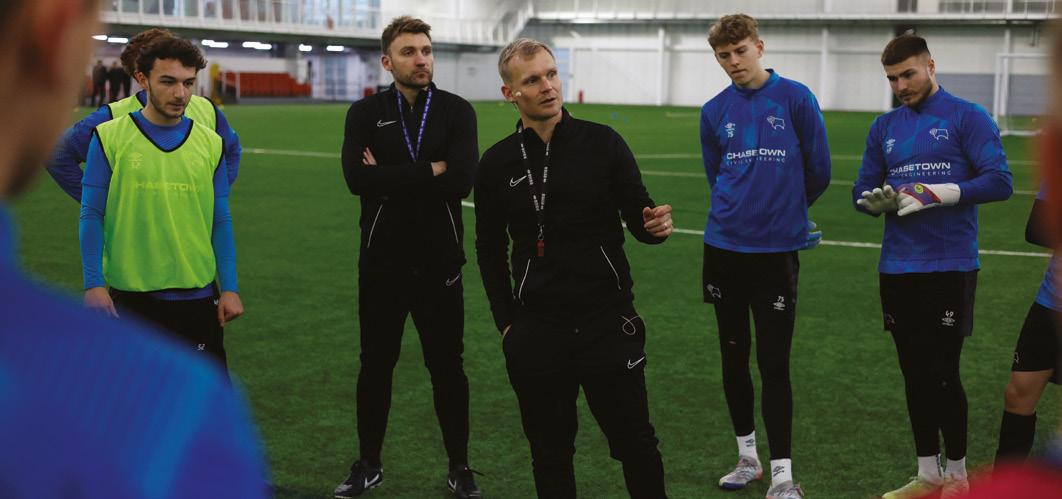
contemporary ideas to prepare players and teams for games, while Floyd Woodrow MBE delivered a session on the importance of vision and values.
The third presentation, delivered by Simon Felstein, was on building a media strategy, and included insight on interacting, and building relationships, with the media.
04 LMA Masterclass: January St. George’s Park hosted the third LMA Masterclass of the season, which kicked off with a workshop by LMA Technical Partner SkillCorner. Paul Power, Paul Neilson and Craig Inness explained how their unique broadcast tracking technology can analyse and quantify players’ physical, technical and tactical attributes.
Dr Mustafa Sarkar then presented on the importance of developing resilience in football and the role of a challenge mindset. Between presentations, LMA member
Liam Manning and Chris Hogg held an on-pitch session, exploring how to embed key principles of play into a game-based scenario.
The final presentation, from Katie Mobed, looked at highperformance culture, covering the importance of setting vision and values within a team, and psychological safety.
05 LMA Football Mentor Graduation
The 2022 cohort of the LMA Mentor Training programme graduated at St. George’s Park in December.
The ILM-assured course is specifically designed for people working in the sports industry who want to help individuals build their careers. The practical course develops transformational skills by blending best practice, theoretical research and practical application.
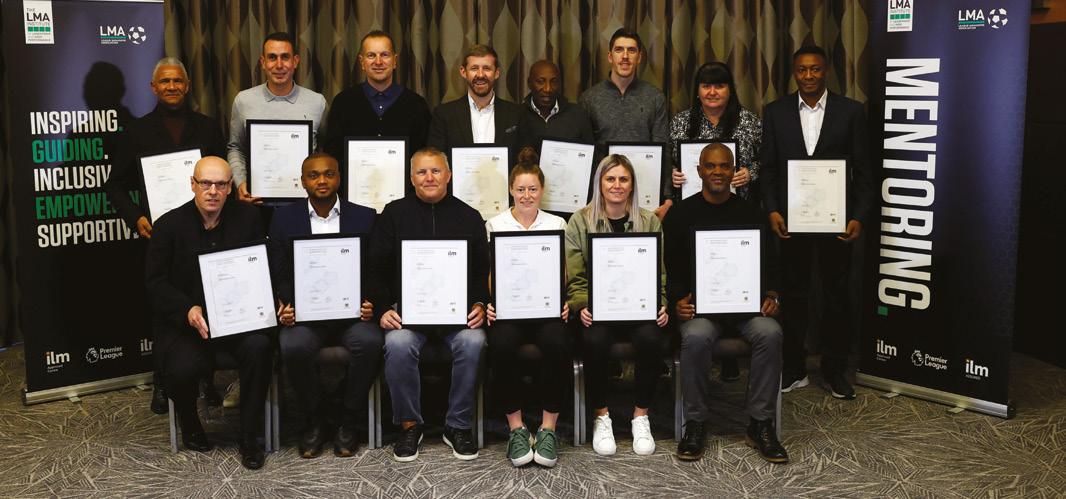
04 02 05 03 League Managers Association 61
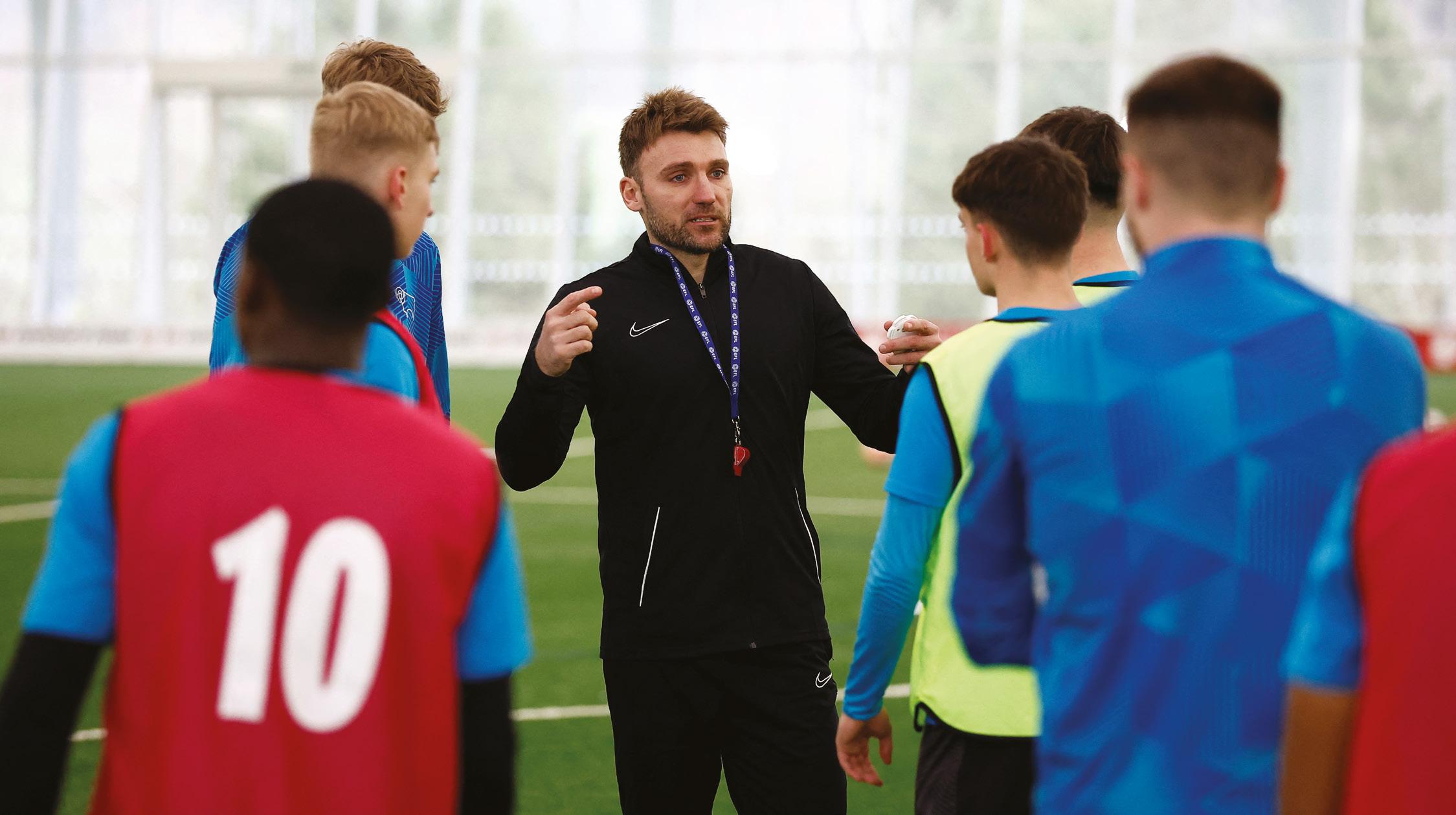


LEAGUE COACHES ASSOCIATION.
“
English football has one of the most exciting cohorts of professional practitioners in world football. This is playing a hugely important role in the success of the domestic game at club and international level, in both men’s and women’s football.
Richard Bevan OBE, LMA Chief Executive
February saw the launch by the LMA of the League Coaches Association (LCA), which will provide a range of member services, including employment and legal support, a wellbeing and healthcare offering, and personal and professional development programmes.
Over the past 10 years, with increased investment in club infrastructure in men’s and women’s football and the successful implementation of the Premier League’s Elite Player Performance Plan, the number of coaching and performance roles in the professional game has grown significantly. These roles have also become more complex and specialist. After consultation between the LMA and the Premier League, the LCA has replaced the Professional Football Coaches
Association, which has served the coaching community since 1992.
Membership will be open to all coaches and football technical staff in the English men’s and women’s professional games, at senior and academy levels. The LMA and Premier League will be initial funding partners of the LCA, with the LMA providing strategic support and resources.
Based at St. George’s Park, the LCA will reflect the energetic, innovative and progressive nature of domestic coaching, uniting and strengthening a significant professional community. It will enhance the quality and perception of coaching and technical support throughout the game, while providing important personal support to the game’s growing and talented coaching workforce.
League Managers Association 63 THE MANAGER
TAL BROWN


EVALUATING RISK FORECASTING SOLUTIONS.





















Zone7 CEO Tal Brown offers five steps that teams, leagues and other organisations can follow to filter out ineffective providers and their solutions.

The Manager Journal 64 THE MANAGER
At Zone7 we’ve curated a list of steps that professional sports organisations should follow as they assess the legitimacy and quality of different tech solutions, including AI-based products. Following these best practices should allow you to focus on proven and validated solutions and approaches.
1. DEMAND VALIDATION STUDIES
All technology service providers should have evidence of their efficacy, especially those providing algorithm-based tech solutions. At Zone7, for example, we’ve compiled a mix of case studies that prove our technology’s positive real-world impact, including reduced injury rates, more value from investments in athletes, increased psychological certainty for performance practitioners, and improved competitive outcomes.
2. REQUEST A CUSTOM VALIDATION STUDY
Requesting a custom validation study, using your own datasets and/or environment, tests the solution provider’s ability to pivot at short notice, understand your specific needs and adopt the performance metrics that you use to evaluate risk.
3. ASK TO REVIEW THE RAW DATA
Once a vendor has performed a custom validation study for your data, they should be willing to provide the study’s raw data. Making this request establishes trust between you and the vendor and verifies that the technology is built on data algorithms, rather than on manual analysis. Having the opportunity to analyse raw data also enables a more educated and comprehensive follow-on discussion with the provider’s multidisciplinary team around key topics like threshold configuration and false positive rates.
4. VET THE PROVIDER’S PROTECTIONS AGAINST ‘OVERFITTING’
Overfitting refers to cases where an algorithm’s results are skewed to show ‘better’ results, usually because the model
hasn’t ‘learned’ from one set of incidents and been ‘tested’ on a completely separate set. When a solution provider creates a case study for a specific environment there should be absolute transparency about whether, and how, any data from this environment was used to inform the modeling process.
5. THROW A CURVE BALL
Unexpected scenarios are the best form of stress testing. Tasking a solution provider with a separate, yet related, request allows adopters to probe further into a solution’s capabilities and the competence of its engineering team while undergoing due diligence. Curve balls also establish whether an automated solution is truly based on code, or whether its findings are the product of manual analysis disguised as machine-driven.
As with any innovative technology that claims to unlock new insights, the data science solutions market has its fair share of credible and less credible offerings. If a solution provider is truly committed to supporting athletes, performance practitioners and sports organisations, they will not hesitate to meet these requirements.
From our position as a transparent provider, we embrace being tasked with the burden of proof. It is a necessary step that will ultimately foster a stronger, long-term working relationship. Press your prospective tech solution providers on the legitimacy of their claims, especially those around risk forecasting and custom algorithms. The potential financial and competitive gains at stake are simply too great.
League Managers Association 65
MACARI CENTRE.
LMA member Lou Macari is expanding his work to support homeless people in Stoke-onTrent. Lou’s charity, The Macari Foundation, already runs The Macari Centre, a shelter that provides accommodation for 50 people inside self-contained pods within a large warehouse. His latest venture aims to support current residents of the centre who are ready to move into their own permanent homes. The charity will provide 26 fully equipped studio apartments that will give residents a real chance to move on with their lives.
Describing the venture, Lou says: “In footballing terms, it’s like a promotion.”
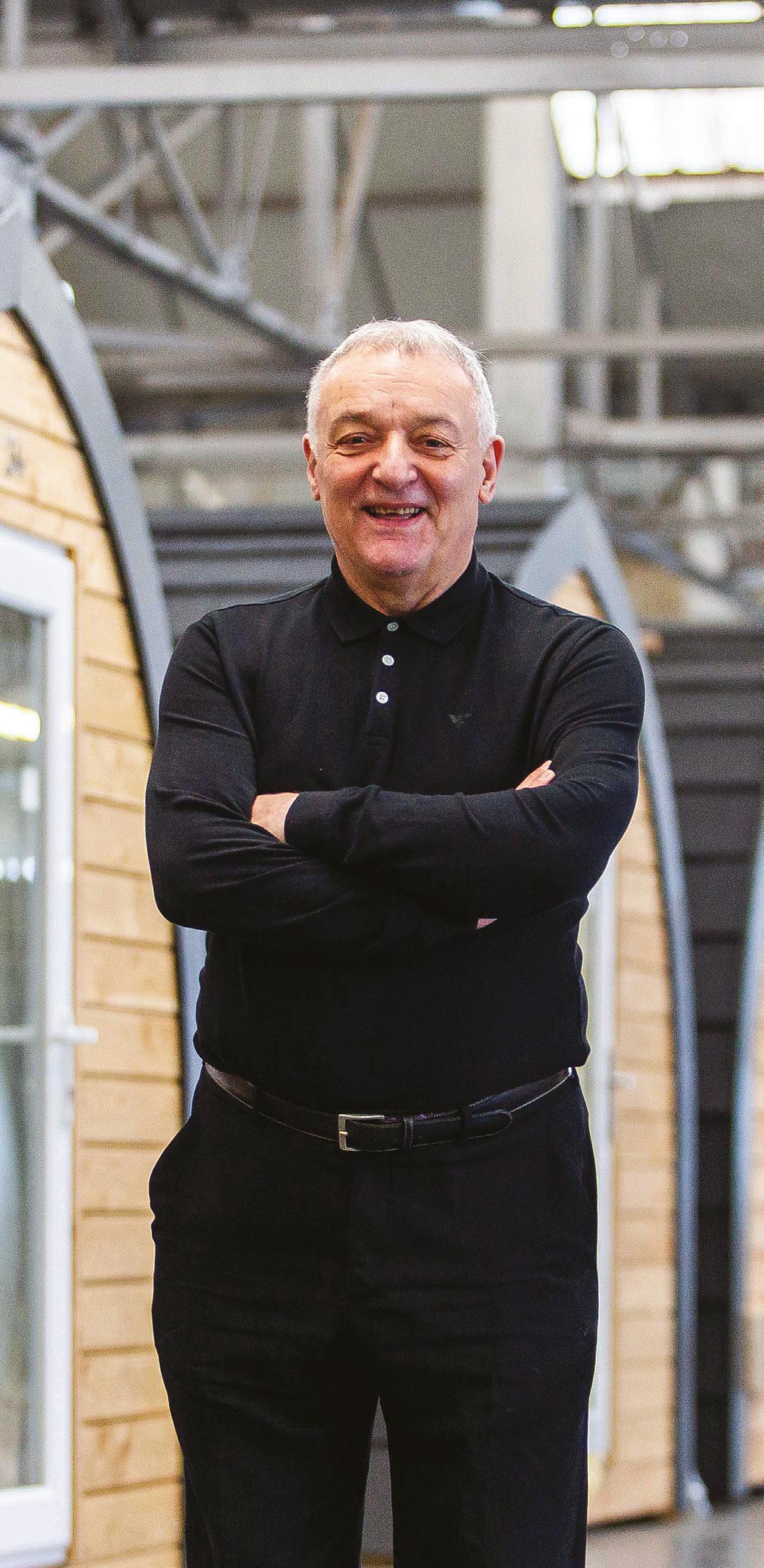
The Manager Journal 66
RAISING AWARENESS OF CPR.
The Justin Edinburgh 3 Foundation this year marked the 4th annual JE3 Day with the release of a new film Raising Awareness of CPR. Family and friends of the late LMA member Justin Edinburgh set up the foundation following his sudden and untimely passing in 2019 with the aim of supporting heart health charities and campaigning for legislative change.

The film aims to give people the ability and confidence to step in and save a life. Each year, more than 30,000 people have an outof-hospital cardiac arrest in the UK, with fewer than one in 10 surviving. Giving CPR and using a defibrillator can more than double a person’s chance of survival.
To watch the film, visit https://vimeo.com/ 791921182/379c31e2cc
LMA IN THE GAME
League Managers Association 67
PROSTATE CANCER UK.
PROSTATE FC
Prostate Cancer UK has launched Prostate FC, the biggest team in football taking on the most common cancer in men.

The home of football at Prostate Cancer UK, Prostate FC gives football fans the tactics to take on the disease from the pitch, the sofa and the stands. It’s a like-minded community to share football stories and get inspired with football-focused fundraising and volunteering opportunities. Fellow fans can connect and collaborate within their clubs and on the charity’s Facebook group, sharing their passion for the game in a way that transcends club rivalries and ultimately saves lives.
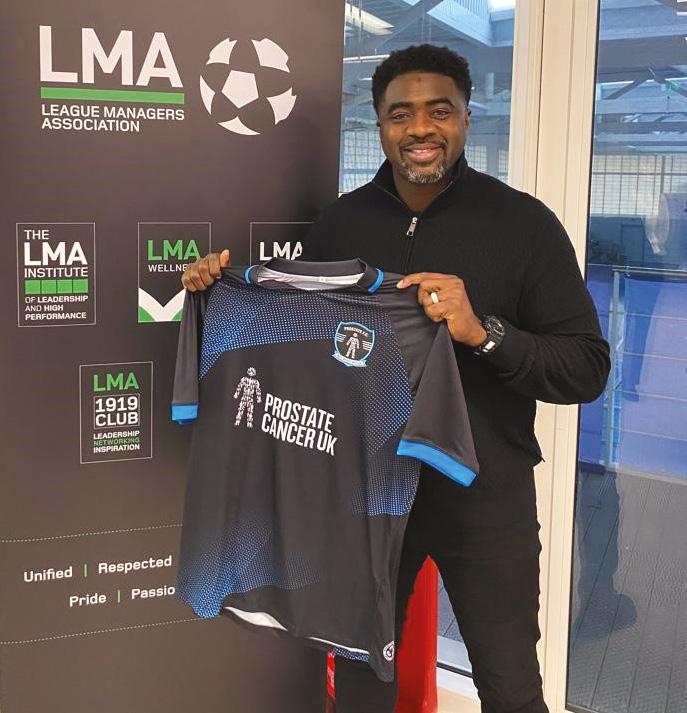
THE MANAGER
LMA members Kolo Touré and Jack Ross supporting Prostate FC.
The Manager Journal 68
ALZHEIMER’S SOCIETY.
To ensure that fans living with dementia can continue to enjoy watching sport, Alzheimer’s Society has recently launched a landmark Dementia Friendly Sports Clubs and Venues Guide (www.alzheimers.org.uk) in collaboration with sporting clubs and organisations across the UK.
The guide provides practical advice for stadiums and grounds to become more accessible and inclusive for people affected by dementia, helping to keep those living with dementia at the heart of the action and connected to the clubs and venues they love.
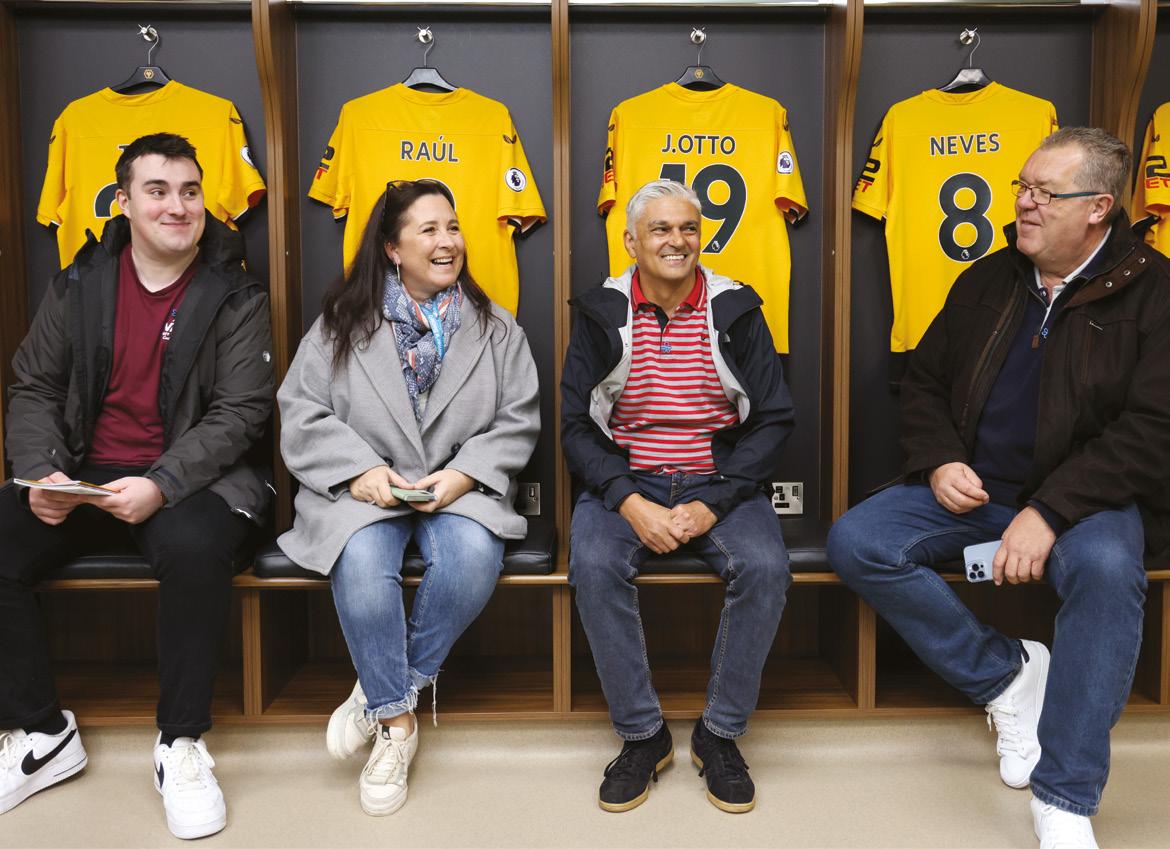
LMA IN THE GAME
Left to right: Tom Benoist and Annie Kirby (Alzheimer’s Society), Tim Hough, and Paul Beedell (Carer and Chairman of Stafford Town FC). // Thousand Star Media
League Managers Association 69
KIDNEY RESEARCH.
There is no cure for kidney disease; it is a lifelong struggle, with the only options being transplants and dialysis. Dialysis is gruelling and can last the equivalent of eight football matches per week. Transplants, meanwhile, don’t last a lifetime, and when a kidney fails it means a return to dialysis. Our goal, therefore, is to prevent kidney disease, and for that we need your help. Think about your kidneys, complete this easy health check and sign up to receive your kidney kit.
www.kidneyresearchuk.org/ kidney-kit
www.kidneyresearchuk.org/ kidney-health-information/ kidneyhealthcheck/

The Manager Journal 70 THE MANAGER
PERSONAL WELLBEING & PERFORMANCE.
League Managers Association 71 THE MANAGER
PERSONAL
WELLBEING & PERFORMANCE COLUMN
Jennifer Lace Head of Psychology and Mental Health, LMA

ONE-TO-ONE PSYCHOLOGICAL SUPPORT.
As the new LMA’s Head of Psychology and Mental Health, I’ll be leading and continuing to develop the valuable psychology and mental health service that the LMA offers to its members, as well as those of the newly launched League Coaches Association.
The Manager Journal 72 THE MANAGER
Taking the strategic lead on the psychology and mental health team, I’ll work closely with the LMA’s two consultant psychiatrists, Dr Allan Johnston and Dr Tim Rogers, and other specialist practitioners, to ensure the LMA offering is cutting edge, robust and covers a wider range of member needs. The team, comprised of highly qualified professionals with a wealth of experience in sporting, non-sporting and clinical environments, is well-equipped to offer a wide range of support aimed at keeping our members, both in and in-between roles, in good mental health.
The emphasis is on one-to-one psychological support, and on ensuring this support is available to all members and their families. That support goes right across the mental health continuum, from working with individuals who have psychological conditions that hinder their dayto-day functioning and mental health, to helping managers flourish and succeed in their professional roles. Everyone’s needs are different, but areas of support may include developing their self-awareness, working with
their backroom teams, sculpting their environments and cultures, and working on game-day behaviours.
Other psychological challenges known to be associated with the profession include self-worth and identity issues, adaptive and maladaptive coping mechanisms and self-soothing strategies. It’s vital that the LMA psychology and mental health team provides safe and confidential spaces for members to speak out about such issues and that we learn from their experiences, so we can inform and improve the services we provide.
Another important element of my new role will be undertaking a project to create a mental health education strategy, which will be made available online and in person to LMA members. I’ll be working across the football industry as a whole, and specifically with stakeholders such as the Premier League, the PFA and national governing bodies, to ensure that the mental health education delivered by the LMA remains at the forefront of innovation and information, with solid research foundations.
I’ll work also within the LMA Institute to ensure the psychology related education and resources that it delivers are always leading edge and of most relevance to our members and the demands they face. I’ll be delivering a range of online resources to ensure all our members have access to this content.
Lastly, I’m looking forward to driving the LMA’s psychological research strategy in conjunction with other staff at the LMA and getting involved in strategic groups that influence football, such as the Mentally Healthy Football Forum and the Professional Players Federation.
Jennifer Lace has worked within domestic and international football for over 10 years, at football clubs and a variety of football national governing bodies, and has helped both athletes and coaches. She has British Psychological Society training through a Doctorate in Psychology and is a member of the British Association of Sport and Exercise Science as a Chartered Scientist.
It’s vital that the LMA psychology and mental health team provides safe and confidential spaces for members to speak out.
League Managers Association 73 PERSONAL WELLBEING & PERFORMANCE
Words: Alice Hoey
HOW TO: EMBRACE DIVERSITY.
KEEP AN OPEN MIND.
When we’re looking for ideas or solutions to a problem, we tend to have a narrow idea of what we’re actually looking for, because we have only our own past experiences, knowledge and perspectives to go on. Recognising these limitations enables us to remove the barriers and see things from as-yet unexplored viewpoints. As well as throwing up new ideas, this enables us to better connect, and therefore meet the needs of, the full range of our stakeholders.
BE FLEXIBLE.
Everyone has their own methods and preferences in order to give their best; we work to different daily patterns, need different work environments and respond to different motivations and rewards. A leader must make sure there is sufficient flexibility in the organisation that no member of the team is held back from fulfilling their potential.
TRANSPARENCY.
Stating that you’re committed to diversity, inclusivity and equality means very little if people can’t see it in action. Communicate and celebrate progress and be open and transparent about any policies, approaches and standards in this area. Ensure people know how to call out incidences of inequality or injustice, and are unafraid to do so.
THE MANAGER The Manager Journal 74
CHECK YOUR THINKING.
However progressive we may think we are, we all have unconscious biases, established and embedded over a lifetime of social and familial conditioning. Recognising that we have these biases and understanding how they present themselves is the first step to ensuring they don’t get in the way of how we recruit, manage and support a high-performing, diverse team.
ANTICIPATE CONFLICT.
Getting the best out of a diverse team means encouraging different ways of working and viewpoints, but it’s inevitable that these may clash at times. Rather than fighting against the tide and attempting to create harmony by quashing disagreement, create an environment where people can challenge one another’s thinking and methods in a respectful and constructive way.
LISTEN FOR SMALL VOICES.
Just because someone has the confidence to speak up, it doesn’t mean their ideas are the most valuable. Some team members may feel uncomfortable voicing their thoughts in front of the group, or may find the platform of an online meeting room intimidating. To ensure everyone’s voice is heard, be conscious of ‘speaking anxiety’ and provide a range of opportunities to contribute.
SEEK AMBASSADORS.
While the leader can and should champion diversity, inclusivity and equality they can’t do it alone. Creating a leadership team within your people, representing their breadth of backgrounds and experiences, can be valuable not only in ensuring standards are upheld, but in giving rising stars and potential new recruits the confidence to excel. You have to see it to be it.
League Managers Association 75
FORCE OF HABIT.
Despite often being thought of as boring or mundane, routines can help us to live healthier, more time-efficient lives, and are a bedrock of learning and resilience.
 Words: Alice Hoey
Words: Alice Hoey
The Manager Journal 76 THE MANAGER
Photography: iStock
By the time this journal lands on people’s desks, most of us will have abandoned our New Year’s resolutions. Many will have forgotten they even made them. Whether the result of waning motivation, forgetfulness or peer pressure, our good intentions are all too quickly squeezed out of our consciousness.
Not so for some people, though. Some are still going for that 6am run, eating more fibre or abstaining from drinking, probably without thinking too much about it. These people have formed new habits, automatic behaviours that they now default to after much repetition and learning.
A 2012 study in the British Journal of General Practice defined habits as “actions that are triggered automatically in response to contextual cues that have been associated with their performance,” and we perform hundreds of them each day. We put a seatbelt on, set the alarm, and hold a child’s hand when approaching a road. We can choose to override these behaviours, but typically we don’t, because they’ve become hardwired in and, for the most part, they make sense.
Routines and habits are at the root of what separates the elite performers of this world from the rest of us, because while
they need a burning desire to win and a steadfast commitment to improve, it would amount to nothing if it wasn’t for practice, endless hours of practice. With an Olympic athlete or a jogger, there’s no ‘should I, shouldn’t I?’ dialogue when they open the door at 6am and feel the damp cold on their face; they set off apace, because it’s what they know and it’s what they do.
TAKE A LOAD OFF
The brain loves habits, because they are like short-cuts, freeing up conscious thinking for other important and more cognitively challenging tasks. Given you make countless small decisions from the moment you wake up, the more of these short-cuts that can be established, the more you can reduce the mental burden.
In practice, this might mean having an evening routine that prepares you for the next day, perhaps check-listing what you need to take to a meeting, planning your route there or physically laying out clothes and shoes. Over time and with repetition, this evening process becomes part of your daily routine, meaning you zap less mental energy each morning and arrive at work ready to hit the ground running. You may even find you have time for activities that reenergise you before work, such as physical exercise, mindfulness, time with

League Managers Association 77 THE MANAGER
the family or a quick lesson on a learning app.
Routines, when planned more formally and practised regularly, can help to shape your whole day, enabling you to work smarter rather than harder and get more done, better. Consciously dividing the working day into segments, whereby you switch from one type of task to another, for example, conserves mental energy and ensures you tackle the most cognitively challenging activities when you’re most on the ball.
Note-making is a valuable habit to acquire here, not only in terms of time management but in establishing routines for sleep, self-reflection and learning. This can take various forms, from keeping a notepad and pen handy at all times, to journaling each evening, to the use of an app such as Google Keep. Notemaking can also help to free the mind of all the clutter, halfformed ideas, to-do items and unfinished tasks that swirl around causing endless interference with the here and now. In his book, Getting Things Done, David Allen refers to these as ‘open loops’, and note-making can help to capture them.
By helping to clear this mental clutter and creating a framework whereby certain decisions are
made automatically, routines also provide a valuable sense of stability in an environment of uncertainty and change. When we have predictable scenarios or habits, the mind knows what to expect, thereby lessening the innate fear we have of the unknown and alleviating anxiety. Studies have shown that daily routines can help reduce the effects of bipolar disorder, aid sufferers of substance abuse and other addictions, and help people manage the symptoms of other mental disorders.
BUILDING AND BREAKING
Just as important as developing positive new habits, of course, is breaking or changing those that have a destructive or negative burden on our lives. Opinions range about just how long it takes to build or break a habit, but most agree on around three weeks as a minimum. Habits that are pleasure-based, meanwhile, are especially difficult to break, because they result in the release of dopamine in the brain, which generates cravings.
Some people find it effective to go ‘cold turkey’ in order to stop such a habit or change a routine, but in most cases it’s more effective and sustainable to make changes little by little, and one at a time. It’s important, too, to be sure in your mind why you want to make the change, what isn’t working
or you feel could be improved. To ensure you stick to a new commitment, it may be useful to write these sentiments down as a statement of intent, which you can refer to later when morale or memory wanes.
If you want to form a habit that becomes almost automatic, rather than just something you do now and again, it’s important to do it at the same time each day and in the same way each time. That might mean scheduling half an hour each day for exercise or a session on a learning app, for example, or always taking a vitamin pill after brushing your teeth. When you link the new activity to another engrained habit in this way, it acts as a helpful cue, reminding you what you need to do next.
James Clear, author of the bestseller Atomic Habits, talks about a four-step cycle of habits and how we can use these cues in particular to form or break a habit. A cue (the smell of baking, for example) triggers a craving (wanting to eat cake), which motivates a response (eating a cake), which provides a reward (satisfaction and pleasure). Because the reward becomes associated with the cue, it creates a neurological feedback loop that gets stronger the more it is followed and reinforced.
To change habits, Clear argues
THE MANAGER The Manager Journal 78
that we need to make the cues as obvious or invisible as possible. In practice, that might mean leaving your trainers by the front door or setting a reminder to do your language learning exercises. Conversely, a smoker might remove all tobacco from reach and avoid environments where they are likely to be among fellow smokers.
Once you’ve identified your motivation and goal, and have determined how and when you will build the habit into your routine, it’s important to
track and reward your progress. Journaling is the ideal way to do this. Weeks can roll into months and it’s important to acknowledge whether the activity has become a part of your routine, notice if it has lapsed and congratulate yourself accordingly. The simple act of noting down daily progress will serve to keep it front of mind and less likely to be forgotten. Rewards are also important in gradually changing the cue-toreward feedback loop in the brain. Someone looking to work smarter and be more organised
might, for example, reward themselves by doing something they enjoy in the extra time they have created.
None of us wants to have our life dictated by habits and routines and, as with most things, what’s important is to find a balance. While we need to be flexible and spontaneous enough to embrace change and manage situations as they unfold, routines provide a valuable framework for our lives, enabling us to work smarter, live healthier and be more resilient.
League Managers Association 79 FORCE OF HABIT
If you want to form a habit that becomes almost automatic, rather than just something you do now and again, it’s important to do it at the same time each day and in the same way each time.
10 IDEAS: SCREENING. 1
LMA SCREENING
The LMA provides annual health screening for its members, in partnership with HCA Healthcare UK. The assessment includes 43 tests and a full physical examination, as well as extra time with the GP to chat through any health concerns or issues. Each test is personalised to take into account personal or family medical history, and the assessment is age and gender specific.
The Manager Journal 80 THE MANAGER
3
CHOLESTEROL
A complete cholesterol test assesses the levels of four types of fats in the blood and can be done via a simple blood test. Fatty deposits (plaques) can lead to narrowed or blocked arteries (atherosclerosis), increasing your risk of heart attack, stroke and other diseases of the heart and blood vessels. As high cholesterol doesn’t always cause symptoms, testing (at least every five years) is key.
Around a third of adults in England have high blood pressure, many without realising it. Blood pressure is a useful indicator of overall health and fitness, and people aged 40 and over should have it checked at least once a year. Consistently high blood pressure can weaken the heart and damage the circulatory system, increasing the risk of heart disease, stroke and kidney disease. Screening, however, can enable lifesaving lifestyle changes to be put in place.
FITNESS TESTING
A fitness assessment comprises a range of exercises to evaluate overall physical health, including tests of cardiovascular fitness, flexibility, and strength and endurance. The information gathered is useful both in guiding advice on lifestyle changes and in the design of bespoke fitness programmes that minimise the risks of exercise while maximising the benefits.
2 4 League Managers Association 81
BLOOD PRESSURE
5
BREAST SCREENING
Around one in eight women in the UK will be diagnosed with breast cancer at some point in their lives. Screening involves an x-ray (mammogram) of each breast and women in the UK are invited to screenings every three years from around the age of 50, depending on where they live. Detecting breast cancer early saves around 1,300 lives each year.
7 6
SKIN The Manager Journal 82
It’s important to be body aware and keep an eye on any changes to your skin. Checking moles every few weeks may help you to spot the early signs of skin cancer, or malignant melanoma. With around 13,000 new cases diagnosed each year, melanoma is the fifth most common cancer in the UK, but early detection and treatment greatly improves the prognosis.
In England, screening for abdominal aortic aneurysm is offered to men in their 65th year, but not routinely to women or younger men, as their risk is considered low. A quick, painless ultrasound of the stomach checks the aorta for swelling, which if left unchecked could enlarge and burst, causing life-threatening bleeding. Given that abdominal aortic aneurysms often don’t cause symptoms, preventative screening is essential.
ABDOMINAL AORTIC ANEURYSM
8 9
CERVICAL SCREENING
Cervical cancer screening involves a ‘Pap’ test, which enables abnormal cells to be found and treated before they develop into cancer. Screening can also identify cancer at an early stage, which is important as there are usually no symptoms. When caught early in this way the chance of surviving cervical cancer is more than 85 per cent. All women between 25 and 64 are eligible for a free cervical screening test every 3-to-5 years.
Bowel cancer is the fourth most common cancer in the UK and the sooner it is detected, the easier it is to treat. Screening can be done at home using a faecal immunochemical test (FIT) kit, which is then sent to a laboratory for analysis. Screening has traditionally been offered every two years to people aged 60 to 74, but is currently being expanded to include everyone over the age of 50.
GENETIC SCREENING
A genetic test may be offered where it is suspected that a health condition is caused by a change to one or more of your genes. For example, you may have close relatives who have had a particular type of cancer. Genetic testing can help to show if you are at a higher risk of certain health conditions and guide doctors in deciding on treatment or on the possibility of joining a clinical trial.
League Managers Association 83 10 IDEAS: SCREENING
BOWEL CANCER SCREENING 10
The Inclusive Leadership in Football Award





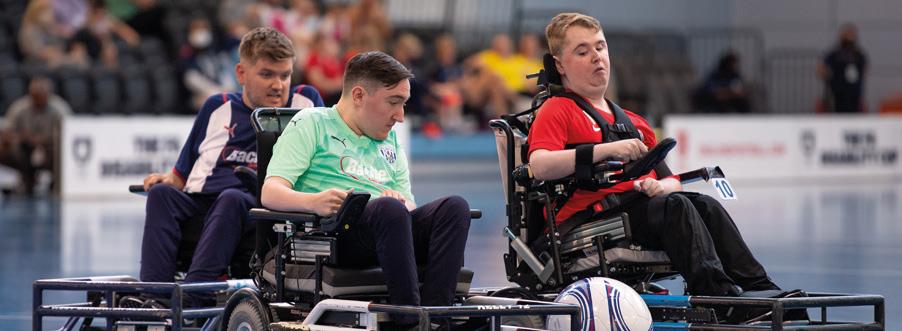


The Inclusive Leadership in Football Award (TILIFA) is delivered in partnership with football’s equality and inclusion organisation, Kick It Out. Designed for existing and aspiring leaders across a range of football contexts, the course introduces learners to a range of issues related to equality, diversity, and inclusion in football. TILIFA is a self-paced, online learning course and includes an alumni base with learners from the Premier league, the Football Association, Professional Footballers’ Association and more.

“Being a part of the course was a real eye opener for me. It has been a part of my journey to where I am today.”
“The TILIFA Course is a fantastic way of developing your practice by helping you understand the protected characteristics and then bringing them to life using high profile case studies and personal experiences. Not often does a CPD opportunity have that much potential!”

LONDON • MANCHESTER • MIAMI • MELBOURNE • NEW YORK • TORONTO MASTER
THE GLOBAL SPORTS INDUSTRY
Tony Fretwell Women’s Super League Academy Manager, The FA
Arran Williams ED&I Manager, PGMOL, UCFB Graduate
GIS.sport GIS.sport SCAN HERE FOR MORE INFORMATION ABOUT THE COURSE www.ucfb.ac.uk/TILIFA23
THE GAME.
League Managers Association 85 THE MANAGER
Interviews: Sue McKellar
Photography: Adam Roussak // Robbie Fowler Academy
KICKSTARTING BRIGHT FUTURES.
Since the launch of the Robbie Fowler Academy in 2015 it has gone from strength to strength, delivering a combination of high-quality education and professional football training.
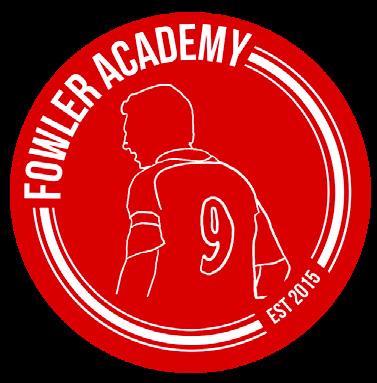

THE MANAGER The Manager Journal 86
ROBBIE FOWLER
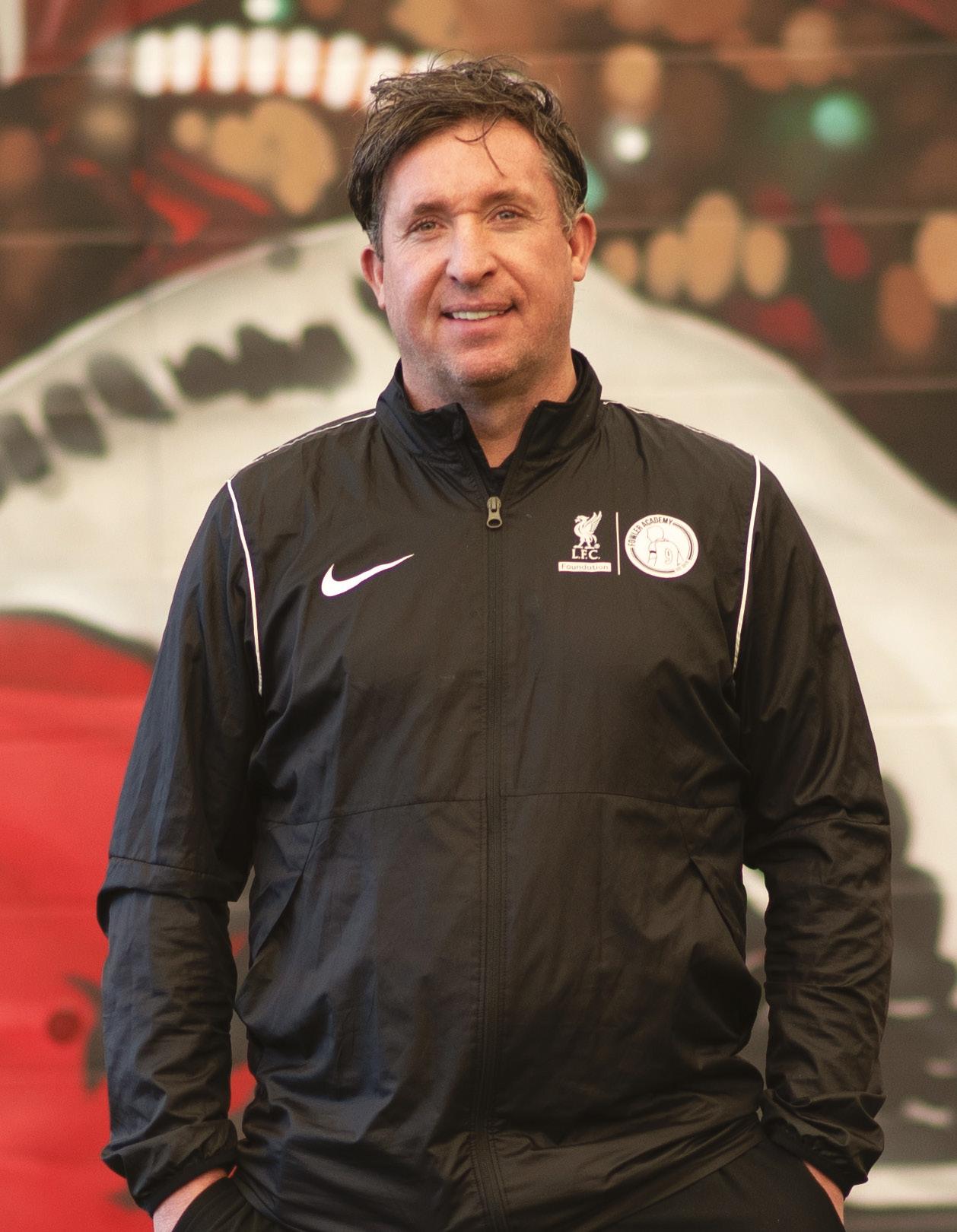
League Managers Association 87
A UEFA pro-licenced coach with experience of managing overseas in Thailand, Australia and India, Robbie Fowler is leading by example when it comes to demonstrating proactivity and hard work in his professional development. As well as currently completing the LMA Diploma in Football Management, Fowler is Technical Director of the Robbie Fowler Academy, a sixth-form college with a unique dual focus on academic excellence and football.
Having witnessed first-hand how aspiring footballers’ education and career prospects can suffer, Fowler saw a need for a new type of pathway, one that would give students as many options to fulfil their potential as possible. While he did well at school, he saw his interest in education begin to drop off once his career in football showed promise. That career blossomed, lasting nearly 20 years and including spells at Manchester City, Leeds and, most notably, Liverpool. He was also an England international.
“Not everyone, however, is so lucky,” says Fowler. “Young players have a tendency to throw all of their eggs into one basket, focusing only on the football side of things. That makes it harder to get the grades they need to go to university or to better themselves in other ways should the football not work out as they hoped.”
INVESTING IN THE FUTURE
Launched eight years ago, the Robbie Fowler Academy offers BTEC courses in Sport and Exercise Science, a full suite of A-Levels, and various sportsrelated vocational qualifications. The academy recently moved to its new home at Melwood, Liverpool’s former training ground, where all the classrooms in the academic wing are named after Liverpool legends to inspire and motivate the students.
It’s a move that Academy
Principal Brian McGorry says has taken them to the next level in what they can provide for students. “Since we launched in 2015 with around 40 students, we’ve expanded year on year,” he says. “We’re now speaking with a number of universities about establishing partnerships with them, and are launching a health course in association with Alder Hey Children’s Hospital.”
Having announced a partnership in 2022, the LFC Women Academy U21s are also based at Melwood, with the girls integrated into the college’s classes and training after their studies.
In total, 200 students are currently enrolled at the college, and they have access to the site from 8am to have breakfast, and use the gym and pool. The morning is spent in academic lessons then, after a break for lunch, groups head out for
football training, learn about video analysis or train in the gym.
“Our students will do a lot of assignments and study work based around what happens on the football pitch,” says Scott Fowler, the academy’s Business Development Manager, “and we invest a lot each year in sports science and tech support. For example, the students will wear the same type of GPS vests as Mo Salah would wear, capturing game data and studying it in the classroom. Football is used as a valuable tool to motivate and engage the students.”
AN AMBITIOUS APPROACH
On the pitch, meanwhile, students get the benefit of training under the guidance of six full-time UEFA-qualified football coaches, explains McGorry, “among them, Robbie and our head coach, Carl Macauley, previously U16 coach at Liverpool.”
The academy’s football teams play in the highest level of college football in the UK, the National Football Youth League, and thanks to a partnership with Liverpool FC the students get to wear replica kits, giving them an extra sense of identity and pride.
“We love to see our football teams doing well, and our coaching provision is really strong,” says Scott Fowler. “However, we are judged
The Manager Journal 88 THE MANAGER
ultimately by our academic results, and we make it clear to prospective students that the college isn’t solely about football. Providing quality education is very important to us.” Indeed, the college has already received an Ofsted Outstanding grade twice and won BTEC Global College of the Year in 2018.
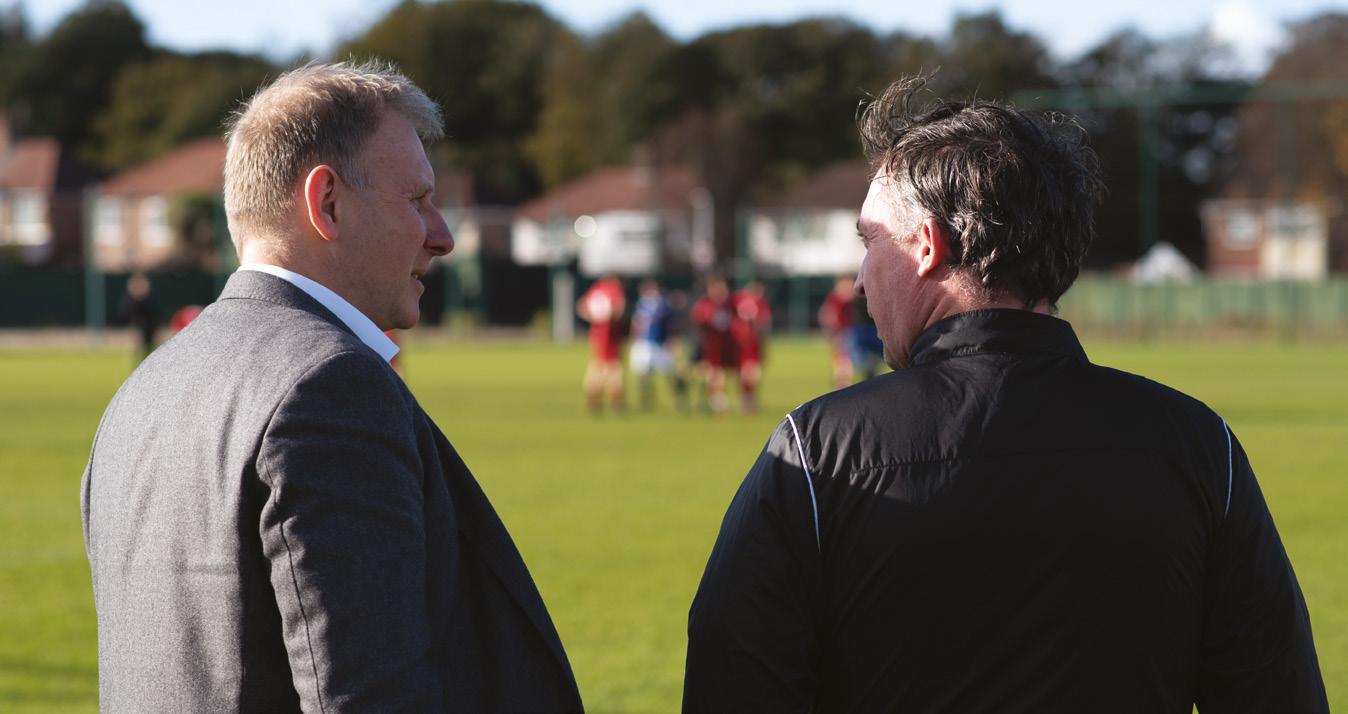
The application process for prospective students is similar to that of any other UK sixth form, he says, with minimum grade requirements. “We try, though, to be as accessible as possible and avoid turning people away. In terms of the football, meanwhile, we facilitate a range of ability from very high standards to students who love football, but
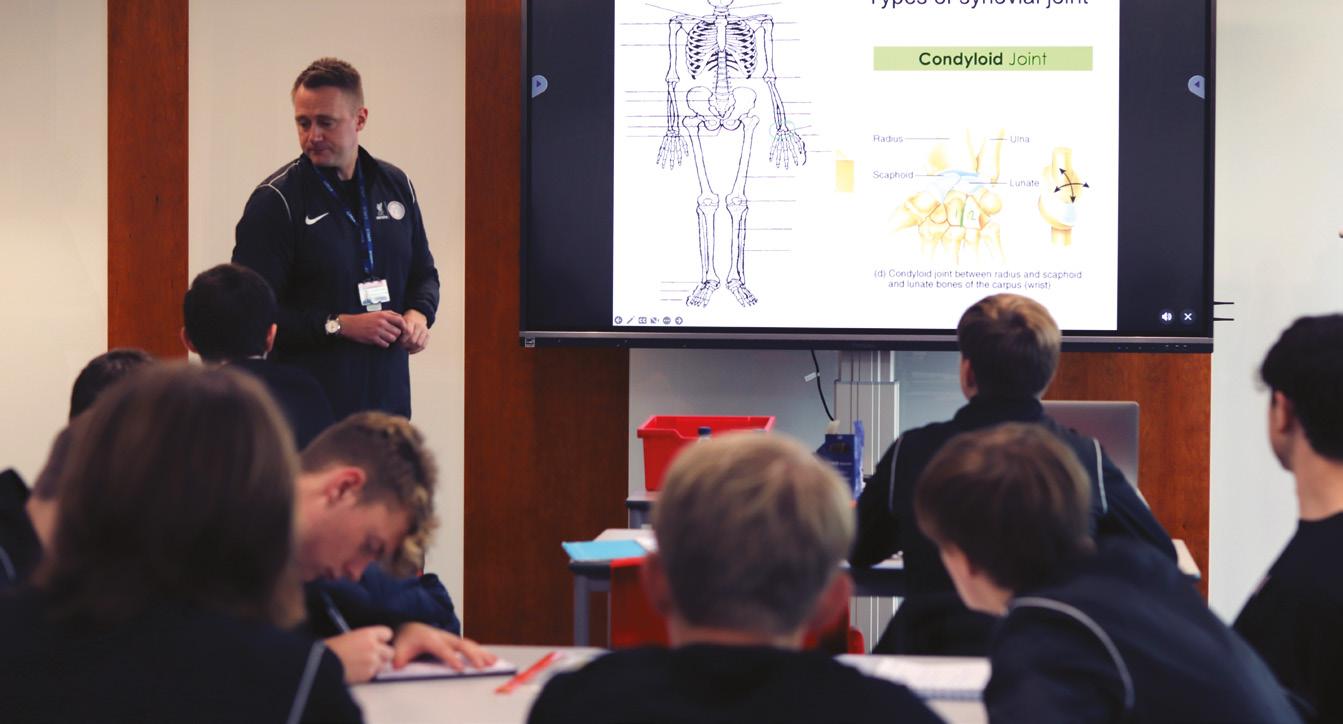
who are not necessarily going to make a career out of it.”
“We also leave the students under no illusion about how hard it is to become a professional footballer,” adds Robbie Fowler. “Students learn about the other possible avenues to working in the game should playing professionally not be an option, and they can aspire to join a scholarship or go to university.”
“In the past five years we’ve seen 82 students from the academy go to university, two of whom have gone on to do a PhD,” says McGorry. “We’ve had kids come to us having never considered university, but who 18 months
later are completing their UCAS applications.”
“We have so many positive stories to demonstrate what students of the academy can achieve,” adds Fowler. “One former student now works for FIFA and we’ve employed a number ourselves.” But perhaps the biggest indicator of the success of the academy, and one of the most rewarding aspects for Fowler, are the testimonials of its former pupils and their parents. “Parents often ask if they can speak at our open days, because they’re so happy with what their kids achieved at the academy. That’s something we can be very proud of.”
thefowleracademy.com
Top: Technical Director Robbie Fowler and Academy Principal Brian McGorry watch from the sidelines as students take part in training.
// Adam Roussak
Bottom: Students study anatomy in the classroom.
// Robbie Fowler Academy
89 League Managers Association
In the past five years, we’ve seen 82 students from the academy go to university, two of whom have gone on to do a PhD.
CELEBRATING EPPP SUCCESS.
A report by the Premier League to mark 10 years of the Elite Player Performance Plan (EPPP) shows significant progress in the development of young, homegrown players.

THE MANAGER The Manager Journal 90
The EPPP was launched by the Premier League in the 2012/13 season in consultation with the English Football League (EFL), The FA and clubs. The aim was to develop a worldleading academy system that would produce more and better homegrown players.
The report reflects on the objectives of the EPPP and its successful implementation over the past decade, and outlines how Premier League and EFL academies are continuing to create unrivalled development environments.
It highlights the achievements made by clubs across the professional game under the EPPP, as well as the significant success seen across the age groups for the England national teams, with four major titles since 2017. The senior team, meanwhile, reached the semifinals of the 2018 FIFA World Cup and the final of UEFA Euro 2020, with several members of that squad being products of the EPPP.
Premier League Chief Executive Richard Masters said, “The EPPP has transformed the development of homegrown talent in academies throughout English football. We have
seen a notable increase in the number and quality of young homegrown players playing in the Premier League. Thanks to unprecedented levels of investment by clubs into the academy system, we have trebled the number of coaches working in youth development, while many clubs have either refurbished or built new training facilities.
“The report celebrates these successes, as well as looking at what we can build on in the years to come. Huge progress has already been made in player welfare and education as we continue to focus on providing life-enriching experiences for all young people in academies. Our goal is that every young person who enters the academy system leaves it as a better, morerounded individual.”
IMPROVING EDUCATION
Investment into youth development is underpinned by a commitment to the holistic development of players. The report shows that the education, care and support that players receive while in academies and beyond has improved significantly.
The GCSE English and maths attainment of Premier League
academy players is above the national average, while increasing numbers are taking up A-Levels. The report also shows there are more than 150 specialist education and player care staff working across the academy system.
The intention of the EPPP report is to build on the progress made and highlight current and future needs of the game that will need to be addressed. A number of objectives have been set and opportunities outlined for the future of the EPPP, underpinned by new Youth Development Rules agreed by Premier League clubs ahead of the 2022/23 season.
These include enhanced player care provisions, including requirements for clubs to have a transition strategy in place, with the increased requirement of three years of aftercare for older players leaving the system.
The EPPP will continue to widen the talent pool to ensure all young people have equity of access and opportunity. This will build on the work already being done to create pathways for under-represented groups through programmes such as the South Asian Action Plan.
League Managers Association 91 THE GAME
NEW-LOOK PLAYER PATHWAY.
The player pathway for women’s and girls’ football is to be transformed, aiming to unearth the very best talent in England and make the game more diverse, accessible and inclusive.
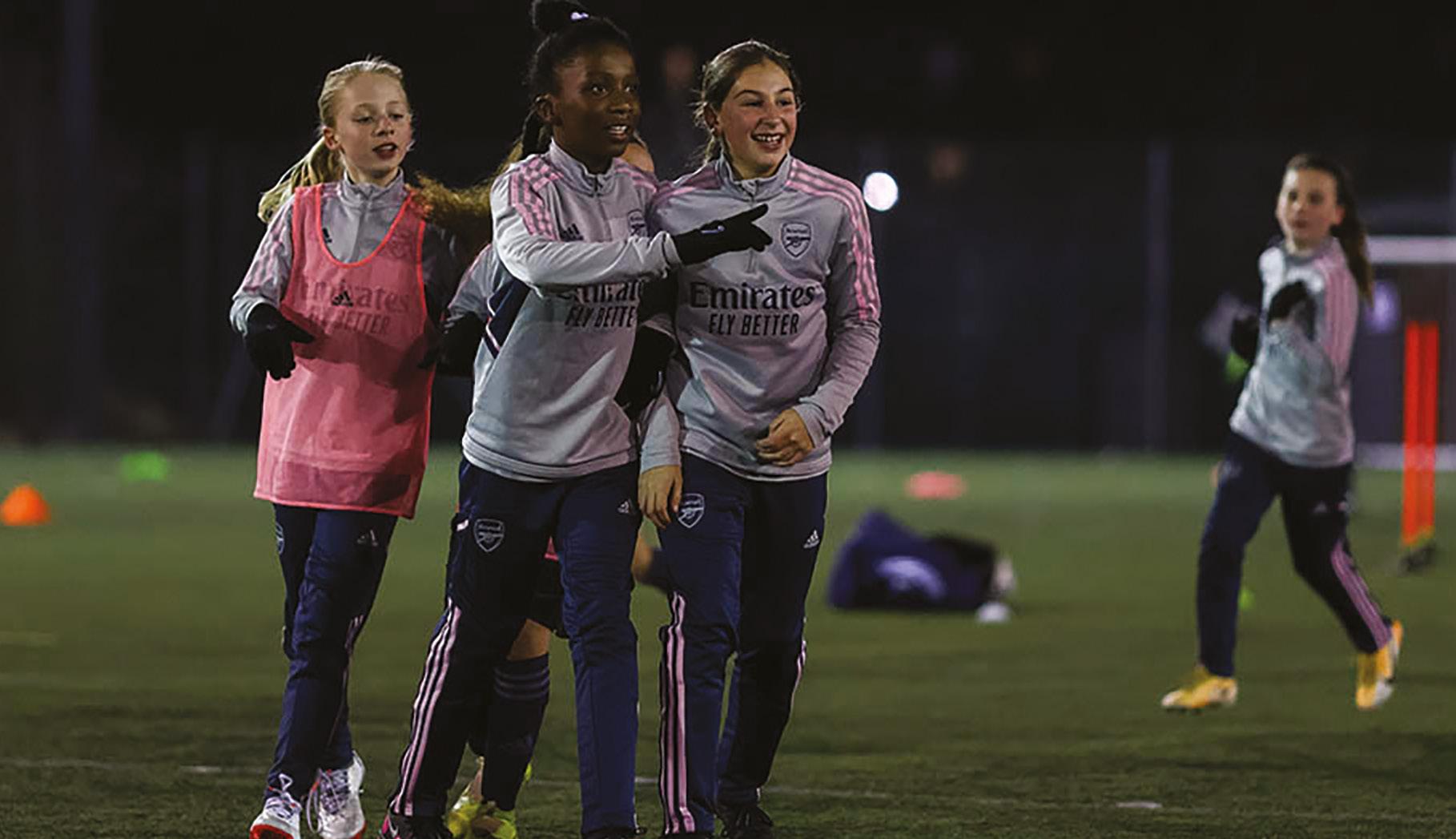
THE MANAGER
Following an extensive consultation period across the game, the new structure sees up to 70 Emerging Talent Centres (ETCs) established across the country, for players aged 8-to-16. These centres replace the existing 28 Regional Talent Centres (RTCs) and 10 Advanced Coaching Centres (ACCs).
By 2024, 95 per cent of players will have access to an ETC within one hour of where they live, while the number of young female players engaged in FA talent programmes across the country will rise from 1,722 to more than 4,200 by the end of the 2023/24 season. The ETCs will have approximately 560 technical staff, compared to some 350 with the current RTCs and ACCs.
The latest development in the player pathway will also see the launch of a new programme for clubs in the Barclays Women’s Super League and Barclays
Women’s Championship. Developed in collaboration with the clubs, the FA Professional Game Academies (PGAs) will come to fruition in the 2023/24 season and will cater for the development of talented players between the ages of 14 and 20.
The PGAs will replace the current FA WSL academies and will improve the readiness of players coming out of the pathway to compete at first-team domestic and international level. FA funding will be focused on two age groups for Category 1 clubs and one age group for Category 2 clubs. Clubs will also have the flexibility to develop their own age groups that supports club-specific philosophy, ambition and resources.
Supported by investment from the Premier League, the ETCs will offer increased playing time and varied football formats, and will allow players to play for both an ETC and a grassroots
club, school or representative team, enhancing the variety of their playing experiences. This will include an emphasis on girls joining boys in a mixed football environment to aid their development.
The transformed player pathway will form part of The FA’s wider approach to identifying and developing talented female players. Last year, for example, saw the launch of the Discover My Talent programme, which aims to identify talent regardless of geographical location or background.
Of the thousands of referrals being made through Discover My Talent, 320 players have been identified as a real talent of interest, while 75 are now in the final stages of selection for England teams between the ages of 15 and 17. This work has been supported by Sport England and UEFA Hattrick funding and is a step-change in how talent is unearthed.
93 League Managers Association THE GAME
The latest development in the player pathway will see the launch of a new programme for clubs in the Barclays Women’s Super League and Barclays Women’s Championship.
England successfully defend their Arnold Clark Cup title, beating Belgium 6 – 1 at Ashton Gate Stadium. The Lionesses continue their unbeaten run under Manager Sarina Wiegman CBE, which now stands at 29 matches.
Reuters // Action Images
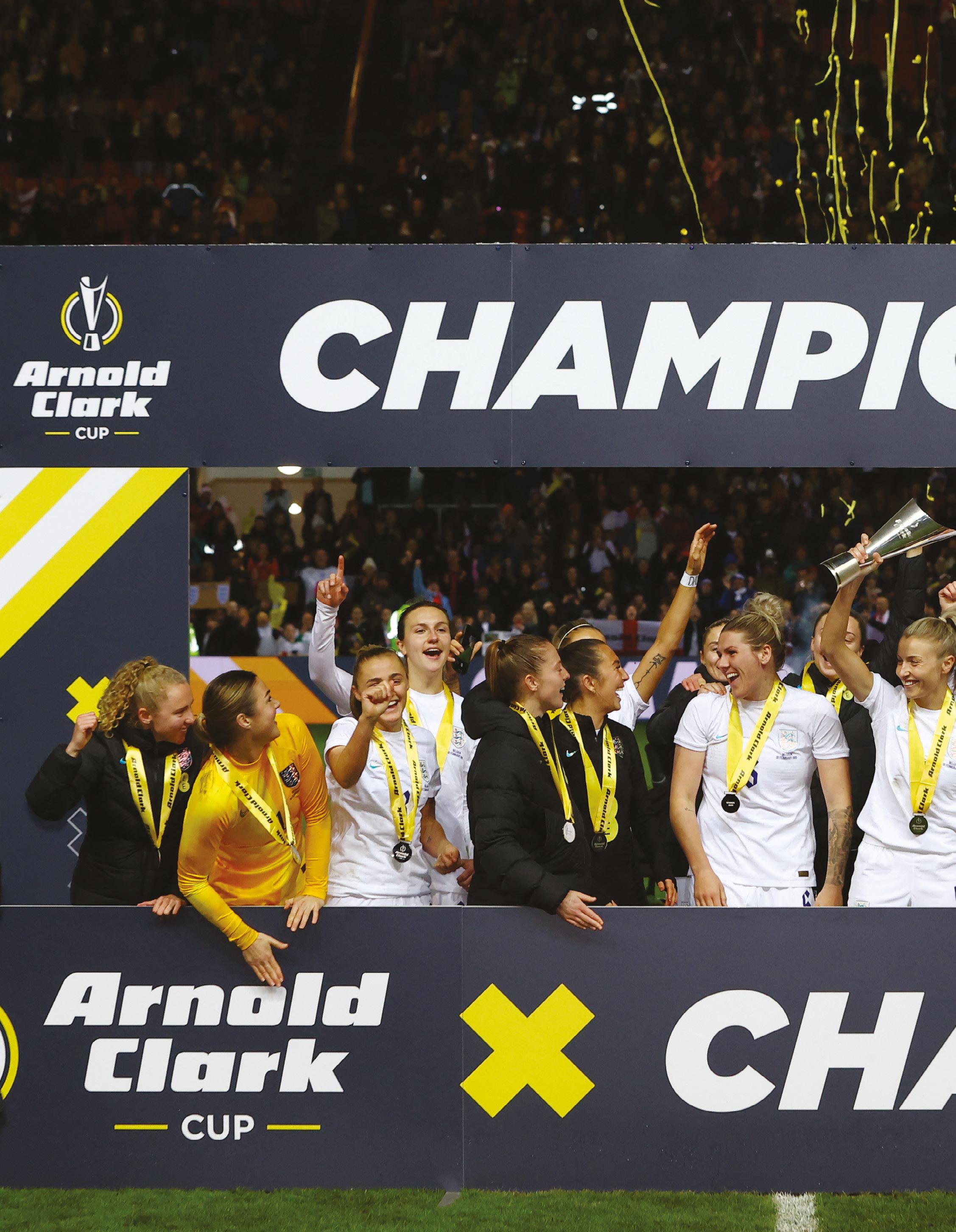
ENGLAND’S RECENT RECORD – W.W.W.W.W.W.D.D.W.W.W.W.W. JUST A MOMENT
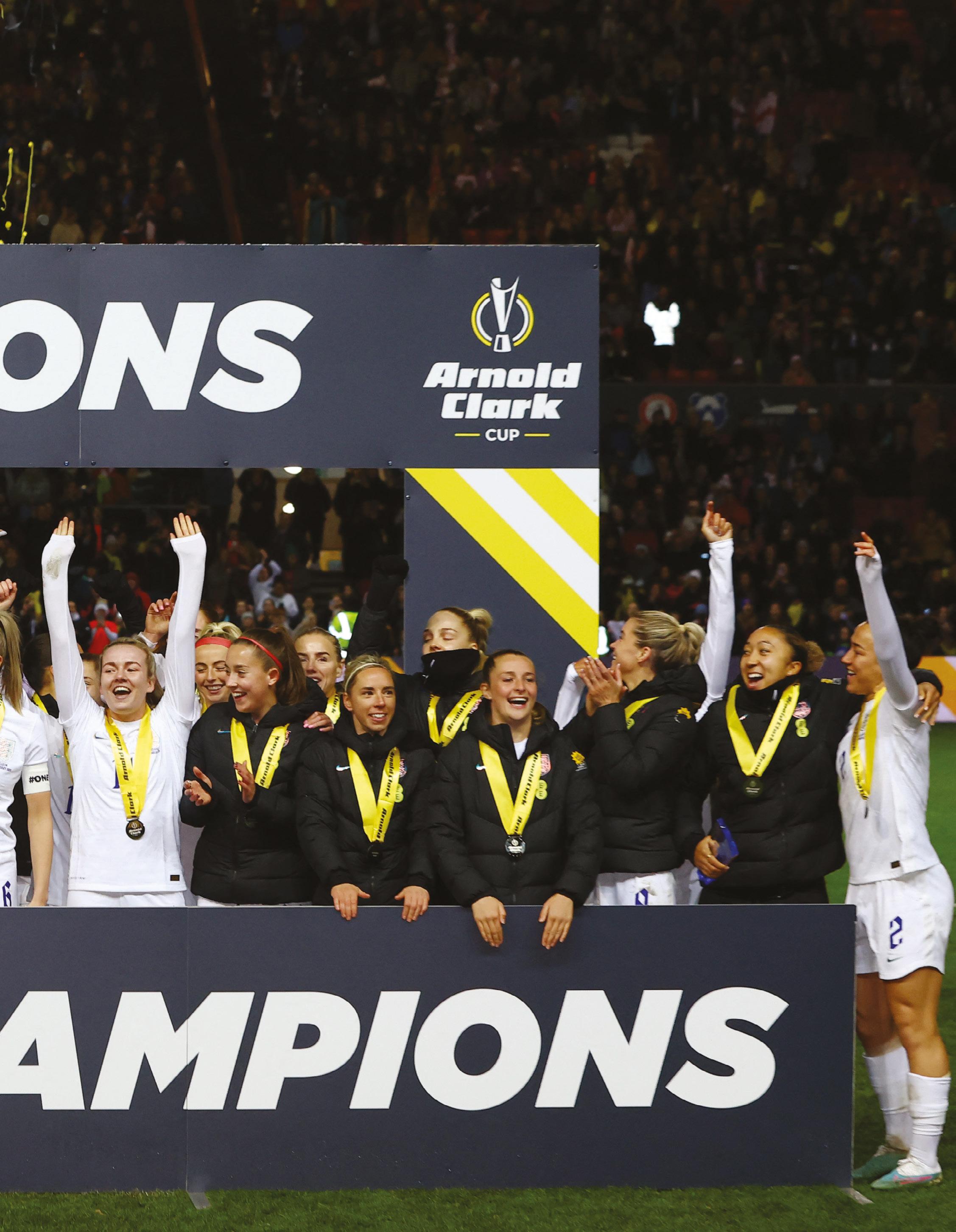
W.W.W.W.W.W.W.W.W.W.D.W.D.W.W.W – WINS: 25, DRAWS: 4





V isit www.bt.com/sport
All in one place





















 Photography: Reuters // Action Images
The LMA remembers member, former manager and friend Gianluca Vialli.
Photography: Reuters // Action Images
The LMA remembers member, former manager and friend Gianluca Vialli.

 Richard Bevan OBE
Chief Executive
21st May 2000: Chelsea Manager Gianluca Vialli joins the Chelsea FA Cup Parade, Fulham Broadway. Reuters // Action Images
LMA
25th August 2000: Chelsea Manager Gianluca Vialli during training. Reuters // Action Images
Richard Bevan OBE
Chief Executive
21st May 2000: Chelsea Manager Gianluca Vialli joins the Chelsea FA Cup Parade, Fulham Broadway. Reuters // Action Images
LMA
25th August 2000: Chelsea Manager Gianluca Vialli during training. Reuters // Action Images














 Liverpool’s Steven Gerrard MBE lifts the Champions League trophy with his team mates. Reuters // Action Images
Liverpool’s Steven Gerrard MBE lifts the Champions League trophy with his team mates. Reuters // Action Images










 Manager Marieanne Spacey-Cale MBE (Southampton FC Women) discusses tactics during a Barclays FA Women’s Championship League game.
// Alamy
Manager Marieanne Spacey-Cale MBE (Southampton FC Women) discusses tactics during a Barclays FA Women’s Championship League game.
// Alamy

 // Alamy
// Alamy






















 02 LMA Ambassador Kelly Smith MBE took part in a Q&A for students and alumni at UCFB’s Wembley Campus.
03 LMA Ambassadors Paul Merson and Mick McCarthy attended a private dinner with Anglian at The Gherkin in London.
04 LMA Ambassador and Newcastle United Manager Eddie Howe took part in a content interview for UCFB at the Newcastle Training Ground.
05 LMA Ambassador Ian Holloway hosted two grassroots coaching sessions at Bristol Rovers Junior Supporters Club, on behalf of Utilita Football, and supported Utilita’s Football Rebooted campaign.
06 LMA Ambassador Sam Allardyce took part in a Q&A for students and alumni at UCFB’s Etihad Campus.
07 LMA Ambassador Robbie Fowler took part in the Donnelly Group Aftersales Super Draw on behalf of the LMA and Castrol.
02 LMA Ambassador Kelly Smith MBE took part in a Q&A for students and alumni at UCFB’s Wembley Campus.
03 LMA Ambassadors Paul Merson and Mick McCarthy attended a private dinner with Anglian at The Gherkin in London.
04 LMA Ambassador and Newcastle United Manager Eddie Howe took part in a content interview for UCFB at the Newcastle Training Ground.
05 LMA Ambassador Ian Holloway hosted two grassroots coaching sessions at Bristol Rovers Junior Supporters Club, on behalf of Utilita Football, and supported Utilita’s Football Rebooted campaign.
06 LMA Ambassador Sam Allardyce took part in a Q&A for students and alumni at UCFB’s Etihad Campus.
07 LMA Ambassador Robbie Fowler took part in the Donnelly Group Aftersales Super Draw on behalf of the LMA and Castrol.





























 Words: Alice Hoey
Words: Alice Hoey























